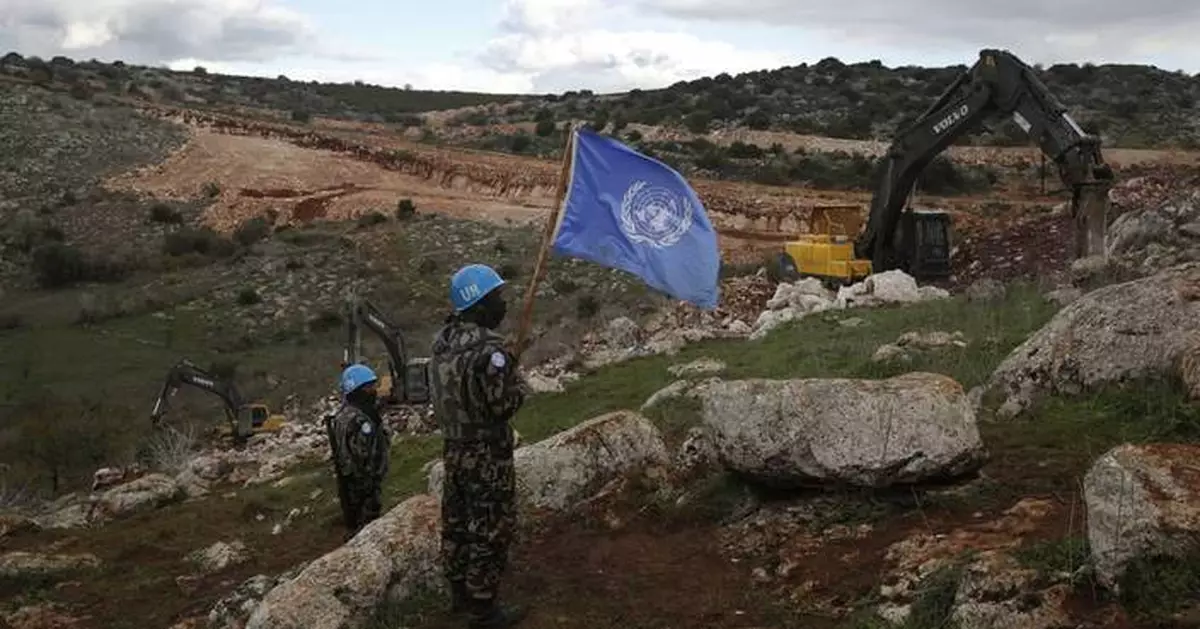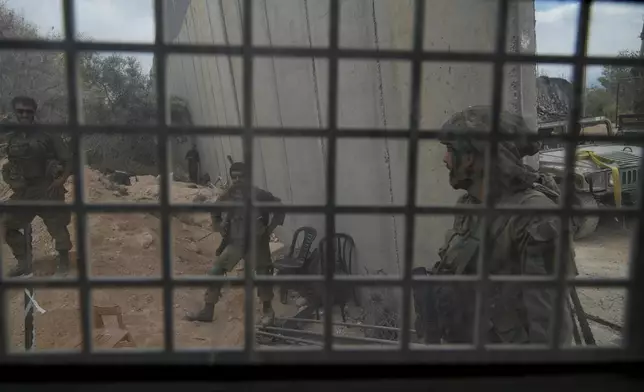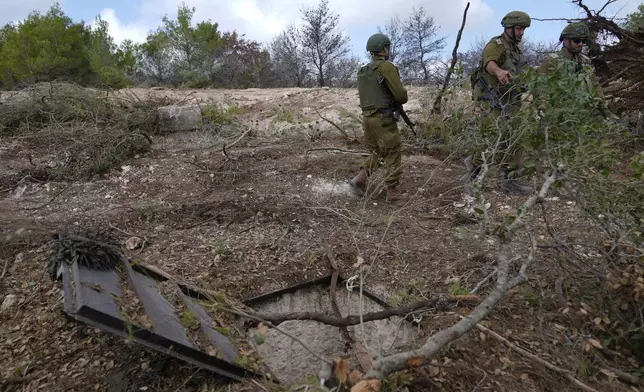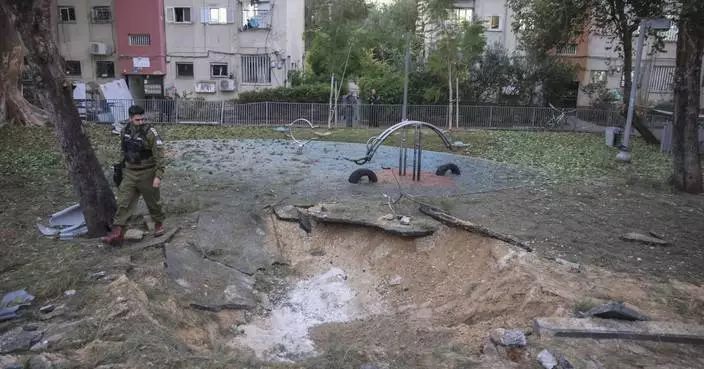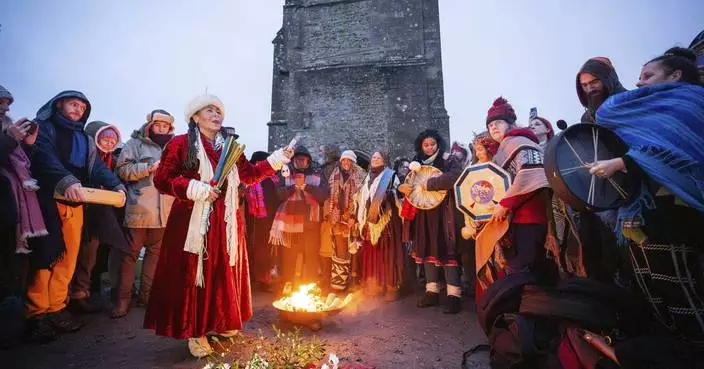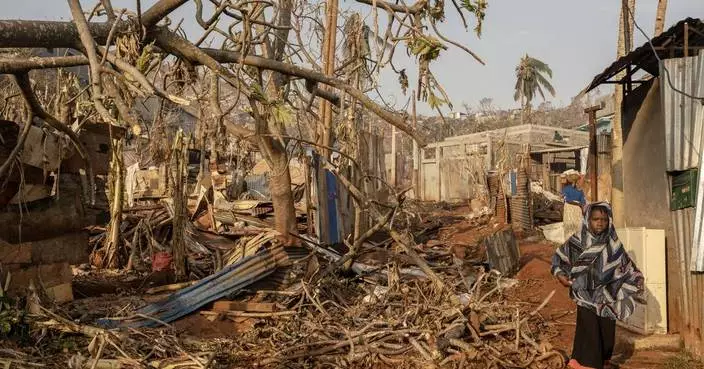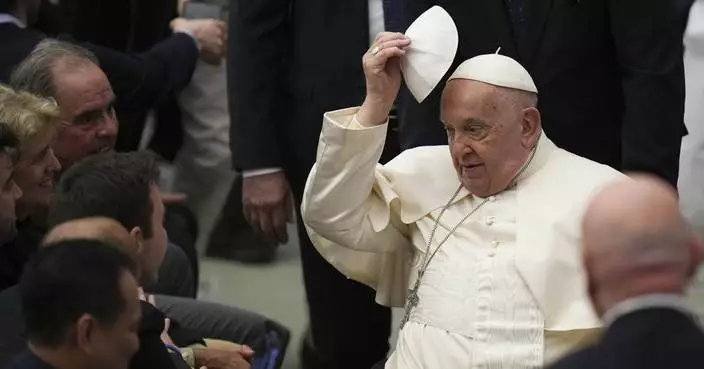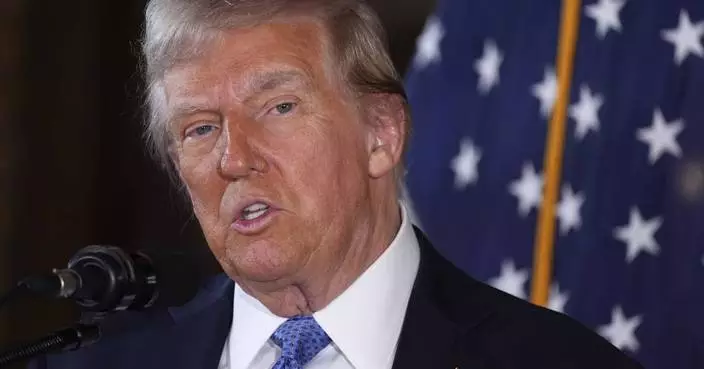BEIRUT (AP) — As the war between Israel and Lebanon's Hezbollah group escalates, a United Nations peacekeeping force in Lebanon is increasingly in the crosshairs, with Israeli troops firing at the peacekeepers' headquarters and positions several times in the past week.
The peacekeepers belong to the 10,000-strong United Nations Interim Force in Lebanon, known as UNIFIL, who have been patrolling the border area between Lebanon and Israel for nearly 50 years.
Click to Gallery
Israeli soldiers are seen during a ground operation in southern Lebanon, near the border with Israel, Sunday, Oct. 13, 2024. (AP Photo/Sam McNeil)
Israeli soldiers display what they say is an entrance to a Hezbollah tunnel found during their ground operation in southern Lebanon, near the border with Israel, Sunday, Oct. 13, 2024. (AP Photo/Sam McNeil)
Israeli soldiers display to the media what they say is Hezbollah gear found during their ground operation in southern Lebanon, near the border with Israel, Sunday, Oct. 13, 2024. (AP Photo/Sam McNeil)
Israeli soldiers display what they say is an entrance to a Hezbollah tunnel found during their ground operation in southern Lebanon, near the border with Israel, Sunday, Oct. 13, 2024. (AP Photo/Sam McNeil)
Israeli soldiers are seen during a ground operation in southern Lebanon, near the border with Israel, Sunday, Oct. 13, 2024. (AP Photo/Sam McNeil)
Italian Defense Minister Guido Crosetto meets the media during a press conference about the U.N. peacekeeping force in Lebanon, in Rome Thursday Oct. 10 2024. (Mauro Scrobogna/LaPresse via AP)
Italian Defense Minister Guido Crosetto, center, General Francesco Paolo Figliuolo, left, and General Giovanni Maria Iannucci meet the media during a press conference about the U.N. peacekeeping force in Lebanon, in Rome Thursday Oct. 10 2024. (Mauro Scrobogna/LaPresse via AP)
FILE - UN peacekeepers hold their flag, as they observe Israeli excavators attempt to destroy tunnels built by Hezbollah, near the southern Lebanese-Israeli border village of Mays al-Jabal, Lebanon, Dec. 13, 2019. (AP Photo/Hussein Malla, File)
Now, Israel is demanding that they leave the area. International criticism is growing after Israeli forces repeatedly fired on the peacekeepers since the start of its ground operation in Lebanon two weeks ago. Five peacekeepers have been wounded in attacks that struck their positions in recent days, most of them blamed on Israeli forces.
Relations have worsened between Israel and the United Nations over the way Israel has conducted its war in Gaza. In an unprecedented move, Israel earlier this month said the U.N. secretary-general was persona non grata in Israel.
Here’s a look at the U.N. force and the latest developments:
The U.N. Interim Force in Lebanon was created in 1978 to oversee the withdrawal of Israeli troops after Israel invaded and occupied southern Lebanon. Israel invaded again in 1982, and it wasn't until 2000 that it withdrew.
In the absence of an agreed-upon border, the U.N. drew up a boundary between Lebanon and Israel known as the Blue Line, which UNIFIL monitors and patrols.
The United Nations expanded UNIFIL’s mission following the monthlong 2006 war between Israel and Hezbollah, allowing peacekeepers to deploy along the Israeli border to monitor the cessation of hostilities and patrol a buffer zone along the border.
The force currently has around 10,000 peacekeepers in southern Lebanon drawn from around 50 countries, including 16 European Union countries. The largest contributors of troops are Indonesia, with 1,231 peacekeepers, and Italy with 1,068.
They are lightly armed, and while they have the right to self-defense under certain circumstances, their role is mainly observational. This includes patrols, monitoring and reporting violations of U.N. Security Council Resolution 1701, which ended the 2006 fighting. The force also provides support to local communities.
Tensions have been mounting since Israel launched its ground invasion of Lebanon earlier this month. Israel asked UNIFIL to move its personnel further north, and the peacekeeping force refused.
On Thursday, UNIFIL said an Israeli tank “directly” fired on its headquarters in the town of Naqoura, knocking down an observation tower and injuring two Indonesian peacekeepers. It said its headquarters and nearby positions “have been repeatedly hit” and Israel “deliberately” fired on and disabled the headquarters’ monitoring cameras.
On Friday, UNIFIL said new explosions hit its headquarters, injuring two peacekeepers, although it did not directly blame Israel. It also said an Israeli army bulldozer hit the perimeter of another position in southern Lebanon while Israeli tanks moved nearby.
A day later, UNIFIL said its headquarters in Naqoura was hit again, with a peacekeeper struck by gunfire late Friday and in stable condition. It wasn’t clear who fired.
On Sunday, UNIFIL said two Israeli tanks broke into a base and later fired smoke rounds near peacekeepers there. It said 15 U.N. peacekeepers had skin irritation and gastrointestinal reactions. The Israeli troops stayed for 45 minutes, putting the mission in danger, the statement said.
The Israeli army has expressed deep concern over Thursday's incident and said it is conducting a thorough review at the highest levels of command. On Friday, it said its soldiers were responding with fire to an immediate threat against them.
On Sunday, Israel’s military said a tank trying to evacuate wounded soldiers backed into a U.N. post while under fire. It said a smoke screen was used to provide cover.
Lt. Col. Nadav Shoshani, an army spokesman, asserted that Israel has only aimed at Hezbollah, and said Israel has tried to maintain constant contact with UNIFIL.
The military has asserted that Hezbollah operates in the vicinity of the peacekeepers, without providing evidence. Late Sunday, it said that Hezbollah had launched about 25 rockets and missiles from compounds near UNIFIL posts in the past month, with one attack killing two soldiers.
“We regret the injury to the UNIFIL soldiers, and we are doing everything in our power to prevent this injury," Netanyahu said Sunday. "But the simple and obvious way to ensure this is simply to get them out of the danger zone,” he added in a video addressed to the U.N. secretary-general.
UNIFIL, however, is mandated by the United Nations Security Council.
EU foreign policy chief Josep Borrell underlined that the U.N. Security Council decides whether UNIFIL should be moved, “so stop blaming Secretary Guterres,” he told reporters in Luxembourg on Friday.
Israel has long accused the United Nations of being biased against it, and of being ineffective in keeping Hezbollah's weapons away from the border. Relations have plunged further since the start of the war in Gaza.
Israel's demands for the peacekeepers to evacuate the border area and move north would effectively impede the force from doing its mission.
The U.N. peacekeeping chief, Jean-Pierre Lacroix, told the U.N. Security Council on Thursday that UNIFIL wouldn't evacuate its personnel, but because of air and ground attacks it can't conduct patrols.
He said UNIFIL operations have virtually come to a halt since late September, when Israel expanded its campaign against Hezbollah. He added that the security environment has also challenged the resupply of fuel, food and water for U.N. positions.
Lacroix later said 300 peacekeepers in front-line positions had been temporarily moved to larger bases. He said UNIFIL had decided to reduce its footprint “at the most affected U.N. positions by 25%.” On Oct. 3, he told reporters that in some places in southern Lebanon, the number of peacekeepers had been reduced by about 20%.
This version corrects the name of the general to Norkin instead of Nurkin.

Israeli soldiers are seen during a ground operation in southern Lebanon, near the border with Israel, Sunday, Oct. 13, 2024. (AP Photo/Sam McNeil)

Israeli soldiers display what they say is an entrance to a Hezbollah tunnel found during their ground operation in southern Lebanon, near the border with Israel, Sunday, Oct. 13, 2024. (AP Photo/Sam McNeil)
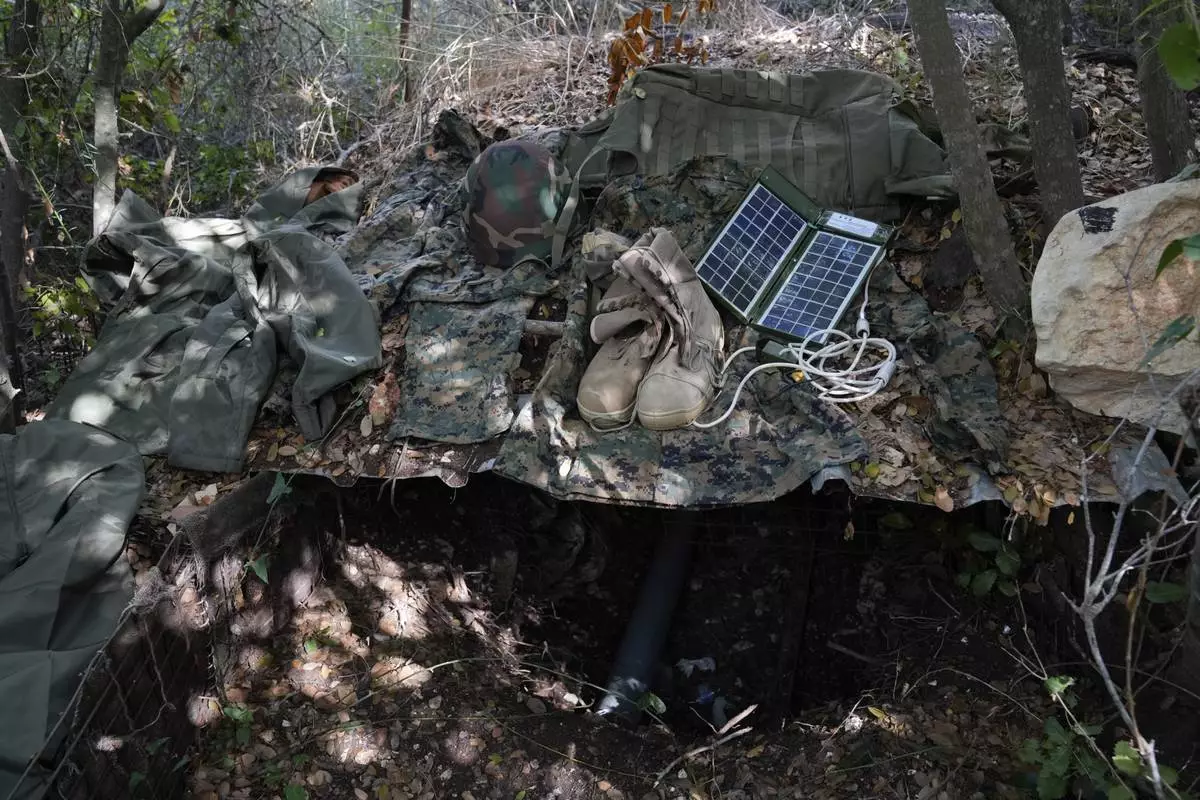
Israeli soldiers display to the media what they say is Hezbollah gear found during their ground operation in southern Lebanon, near the border with Israel, Sunday, Oct. 13, 2024. (AP Photo/Sam McNeil)
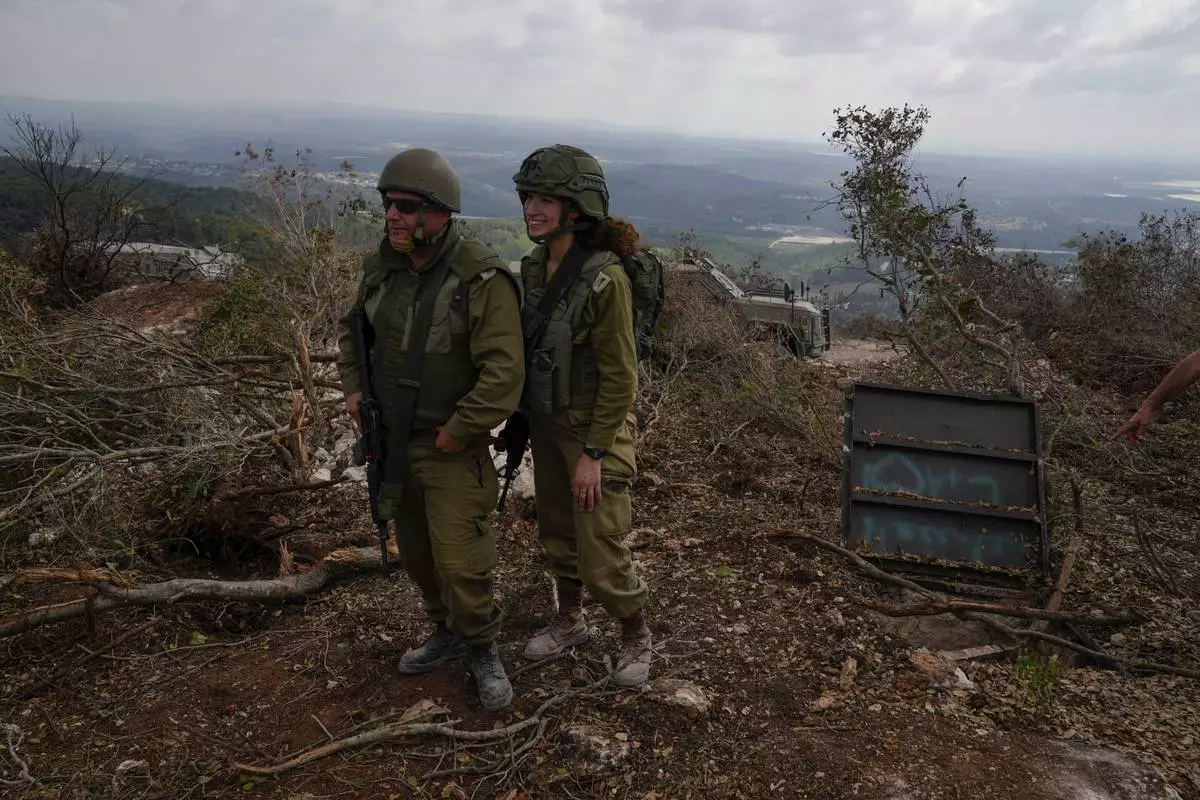
Israeli soldiers display what they say is an entrance to a Hezbollah tunnel found during their ground operation in southern Lebanon, near the border with Israel, Sunday, Oct. 13, 2024. (AP Photo/Sam McNeil)
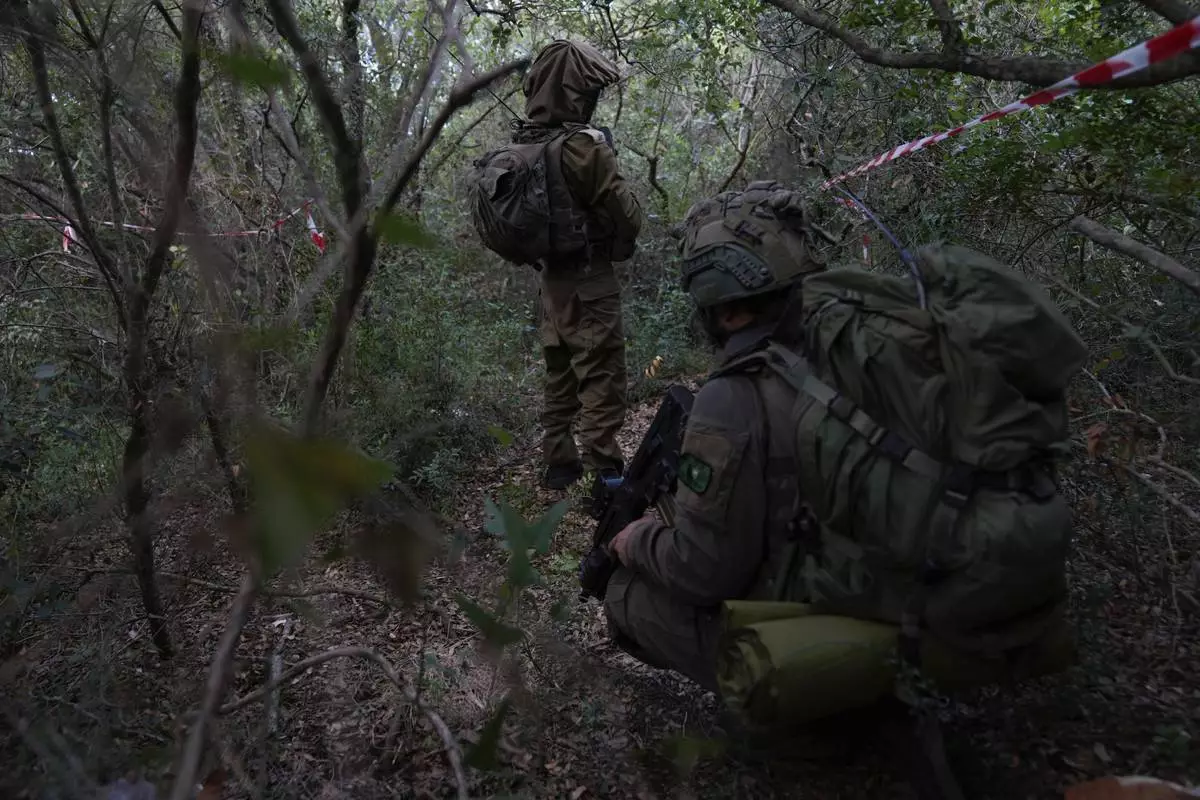
Israeli soldiers are seen during a ground operation in southern Lebanon, near the border with Israel, Sunday, Oct. 13, 2024. (AP Photo/Sam McNeil)
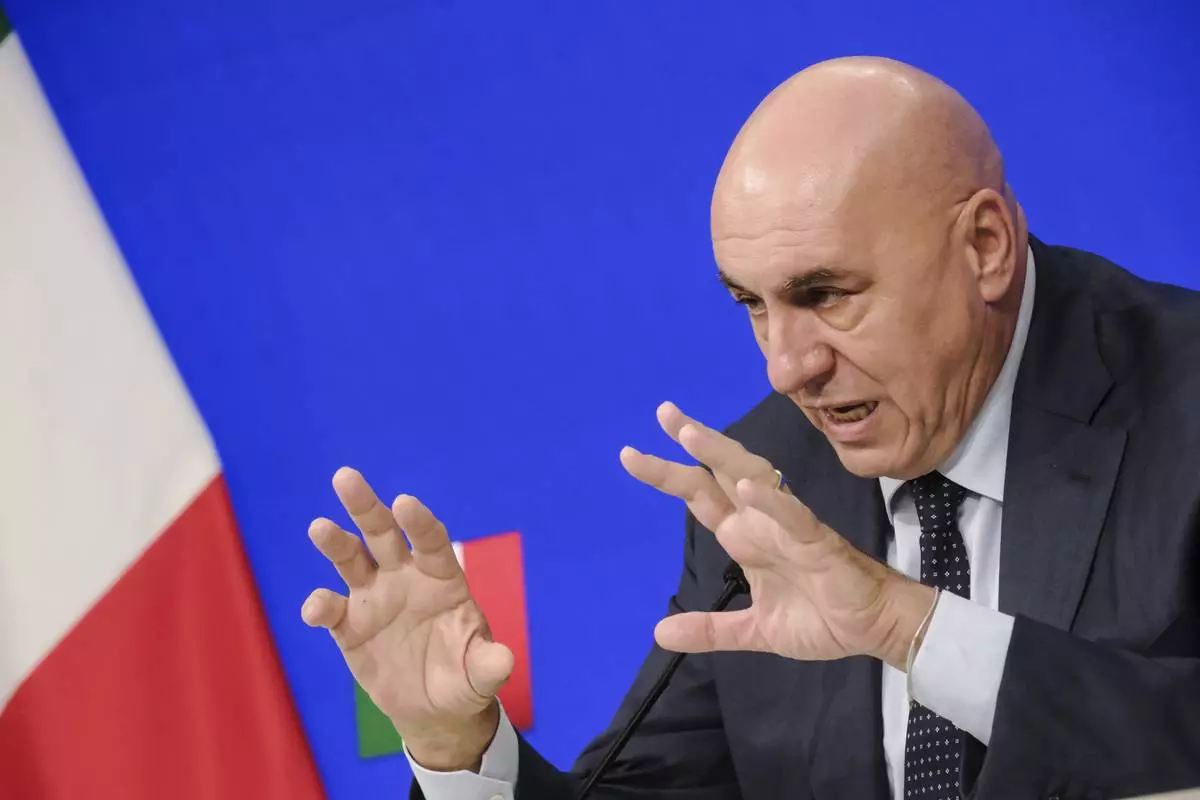
Italian Defense Minister Guido Crosetto meets the media during a press conference about the U.N. peacekeeping force in Lebanon, in Rome Thursday Oct. 10 2024. (Mauro Scrobogna/LaPresse via AP)
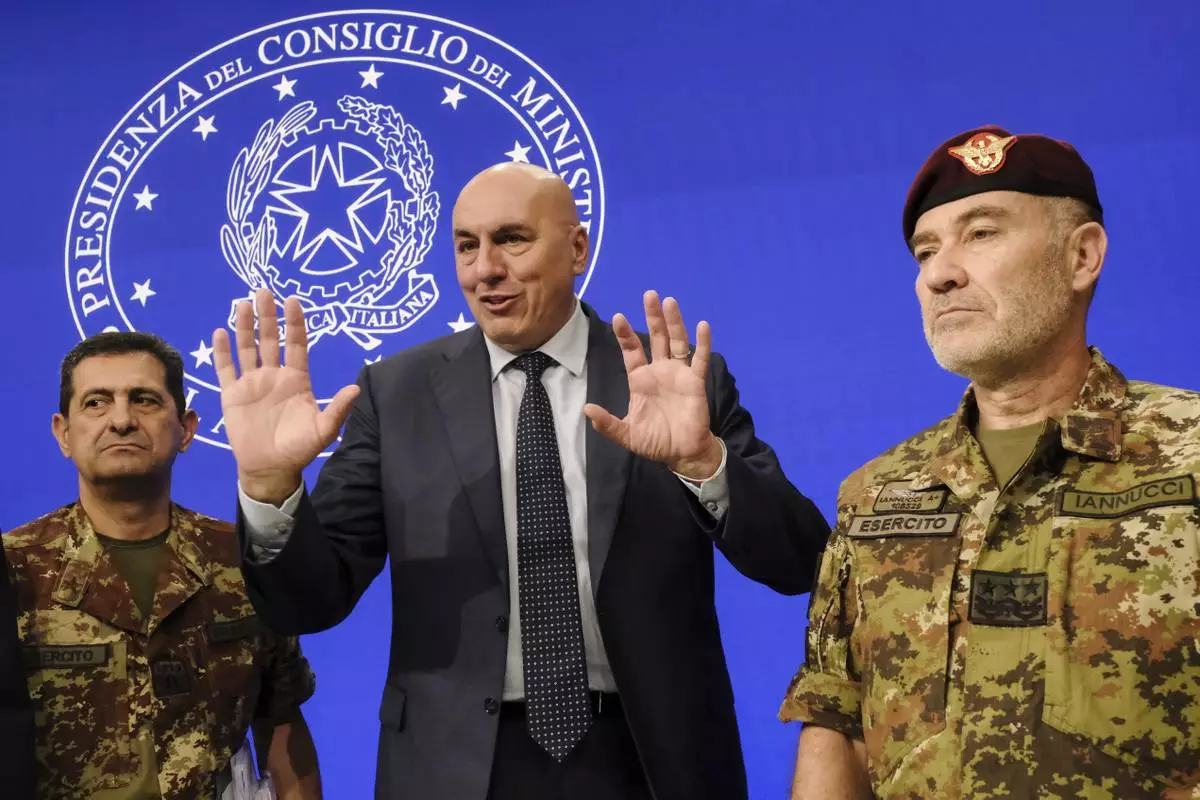
Italian Defense Minister Guido Crosetto, center, General Francesco Paolo Figliuolo, left, and General Giovanni Maria Iannucci meet the media during a press conference about the U.N. peacekeeping force in Lebanon, in Rome Thursday Oct. 10 2024. (Mauro Scrobogna/LaPresse via AP)
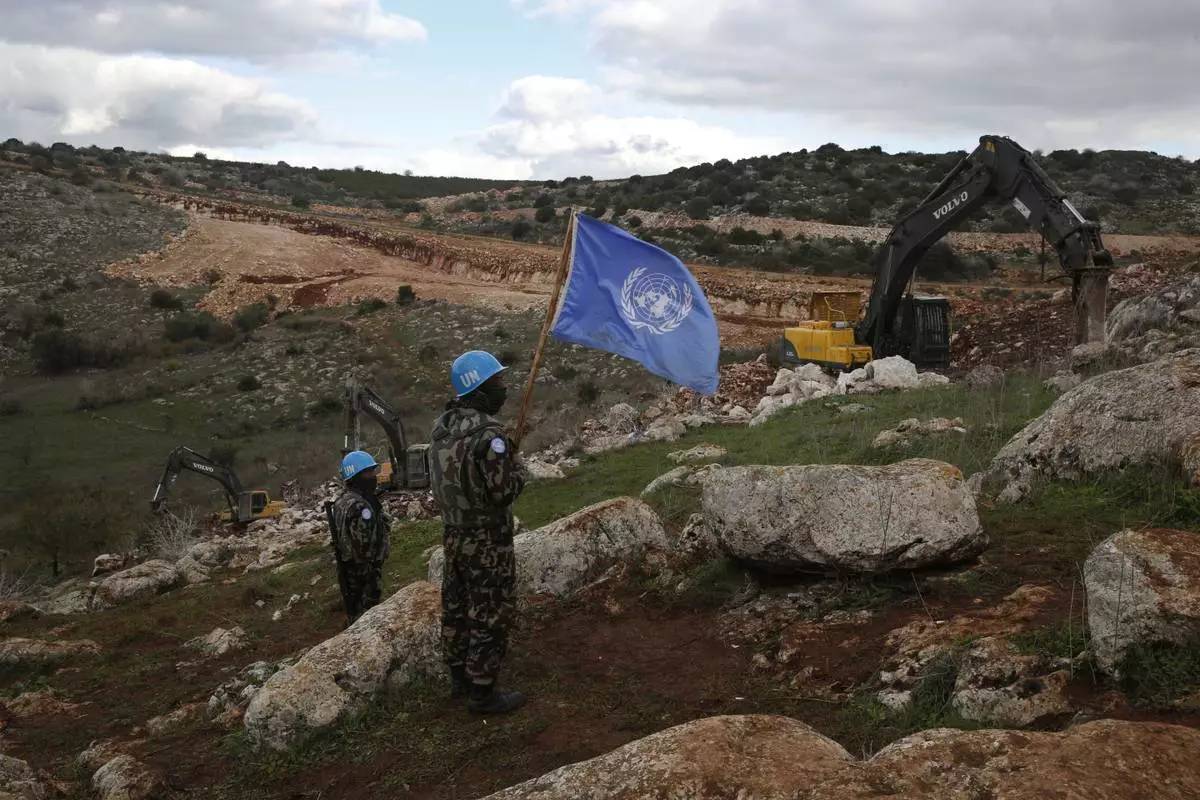
FILE - UN peacekeepers hold their flag, as they observe Israeli excavators attempt to destroy tunnels built by Hezbollah, near the southern Lebanese-Israeli border village of Mays al-Jabal, Lebanon, Dec. 13, 2019. (AP Photo/Hussein Malla, File)
MAGDEBURG, Germany (AP) — Germans on Saturday mourned both the victims and their shaken sense of security after a Saudi doctor intentionally drove into a Christmas market teeming with holiday shoppers, killing at least five people, including a small child, and wounding at least 200 others.
Authorities arrested a 50-year-old man at the site of the attack in Magdeburg on Friday evening and took him into custody for questioning. He has lived in Germany since 2006, practicing medicine in Bernburg, about 40 kilometers (25 miles) south of Magdeburg. officials said.
The state governor, Reiner Haseloff, told reporters that the death toll rose to five from a previous figure of two and that more than 200 people in total were injured.
Chancellor Olaf Scholz said that nearly 40 of them "are so seriously injured that we must be very worried about them.”
Several German media outlets identified the suspect as Taleb A., withholding his last name in line with privacy laws, and reported that he was a specialist in psychiatry and psychotherapy.
Mourners lit candles and placed flowers outside a church near the market on the cold and gloomy day. Several people stopped and cried. A Berlin church choir whose members witnessed a previous Christmas market attack in 2016 sang Amazing Grace, a hymn about God's mercy, offering their prayers and solidarity with the victims.
There were still no answers Saturday as to what motivated the man to drive his black BMW into a crowd in the eastern German city.
Describing himself as a former Muslim, the suspect shared dozens of tweets and retweets daily focusing on anti-Islam themes, criticizing the religion and congratulating Muslims who left the faith.
He also accused German authorities of failing to do enough to combat what he said was the “Islamism of Europe.” Some described him as an activist who helped Saudi women flee their homeland. He has also voiced support for the far-right and anti-immigrant Alternative for Germany (AfD) party.
Haseloff said Friday that authorities believed the man acted alone.
The violence shocked Germany and the city, bringing its mayor to the verge of tears and marring a festive event that’s part of a centuries-old German tradition. It prompted several other German towns to cancel their weekend Christmas markets as a precaution and out of solidarity with Magdeburg’s loss. Berlin kept its markets open but has increased its police presence at them.
Germany has suffered a string of extremist attacks in recent years, including a knife attack that killed three people and wounded eight at a festival in the western city of Solingen in August.
Magdeburg is a city of about 240,000 people, west of Berlin, that serves as Saxony-Anhalt’s capital. Friday’s attack came eight years after an Islamic extremist drove a truck into a crowded Christmas market in Berlin, killing 13 people and injuring many others. The attacker was killed days later in a shootout in Italy.
Chancellor Scholz and Interior Minister Nancy Faeser traveled to Magdeburg on Saturday, and a memorial service is to take place in the city cathedral in the evening. Faeser ordered flags lowered to half-staff at federal buildings across the country.
Verified bystander footage distributed by the German news agency dpa showed the suspect’s arrest at a tram stop in the middle of the road. A nearby police officer pointing a handgun at the man shouted at him as he lay prone, his head arched up slightly. Other officers swarmed around the suspect and took him into custody.
Thi Linh Chi Nguyen, a 34-year-old manicurist from Vietnam whose salon is located in a mall across from the Christmas market, was on the phone during a break when she heard loud bangs and thought at first they were fireworks. She then saw a car drive through the market at high speed. People screamed and a child was thrown into the air by the car.
Shaking as she described the horror of what she witnessed, she recalled seeing the car bursting out of the market and turning right onto Ernst-Reuter-Allee street and then coming to a standstill at the tram stop where the suspect was arrested.
The number of injured people was overwhelming.
“My husband and I helped them for two hours. He ran back home and grabbed as many blankets as he could find because they didn’t have enough to cover the injured people. And it was so cold," she said.
The market itself was still cordoned off Saturday with red-and-white tape and police vans every 50 meters (yards). Police with machine pistols guarded every entry to the market. Some thermal security blankets still lay on the street.
Christmas markets are a German holiday tradition cherished since the Middle Ages, now successfully exported to much of the Western world.
Aboubakr reported from Cairo and Gera from Warsaw, Poland. Geir Moulson contributed from Berlin.
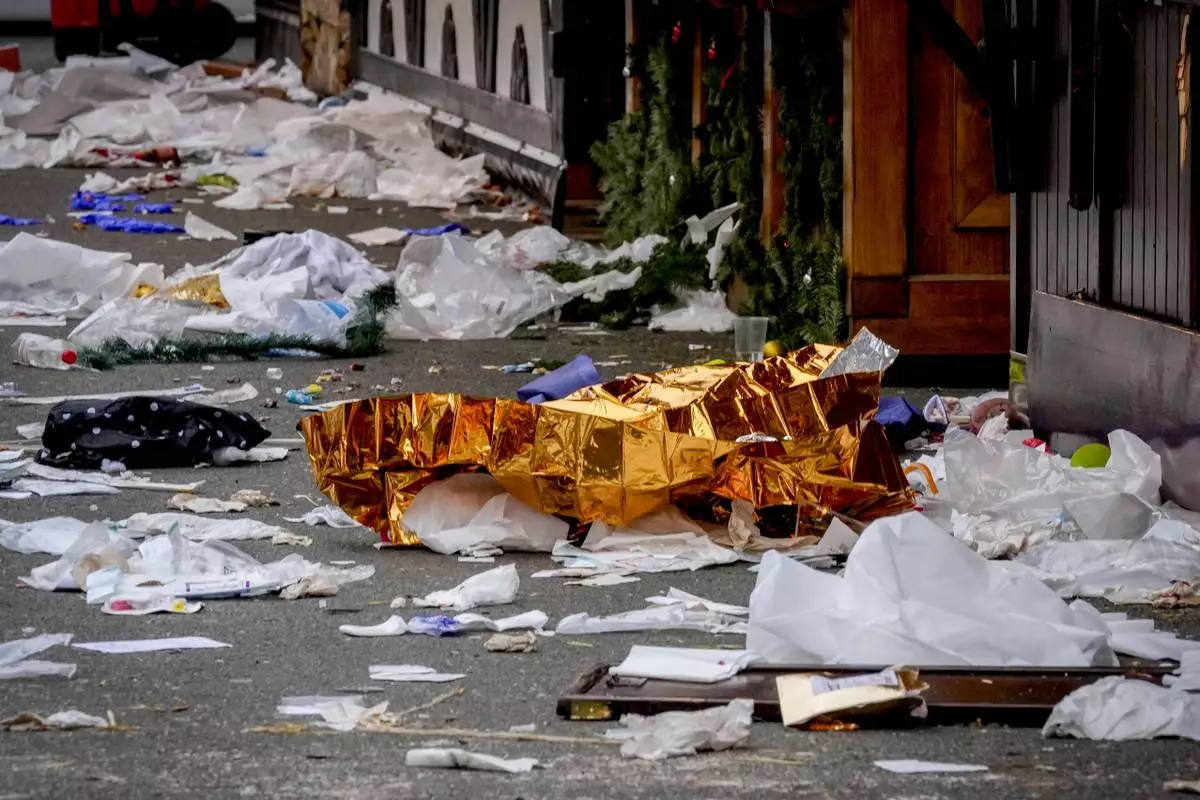
A blanket lies on a Christmas Market, where a car drove into a crowd on Friday evening, in Magdeburg, Germany, Saturday, Dec. 21, 2024. (AP Photo/Michael Probst)
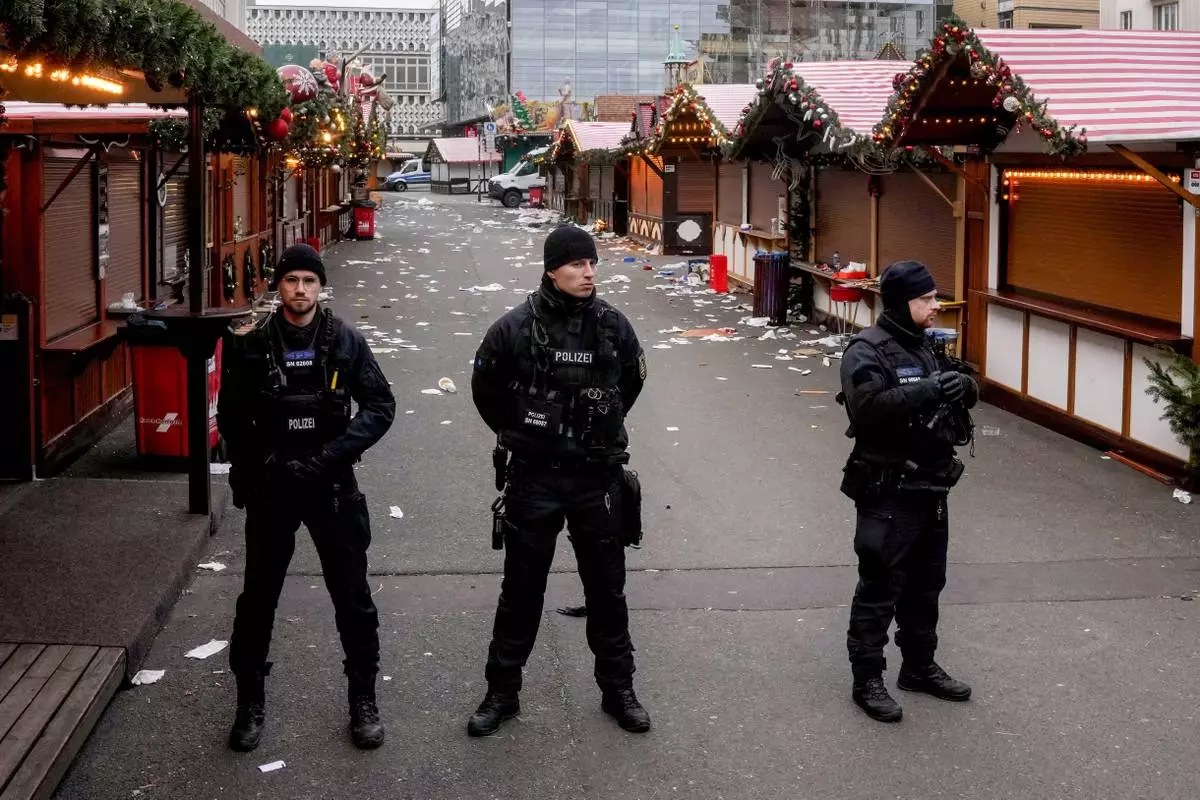
Policemen guard a Christmas Market, where a car drove into a crowd on Friday evening, in Magdeburg, Germany, Saturday, Dec. 21, 2024. (AP Photo/Michael Probst)
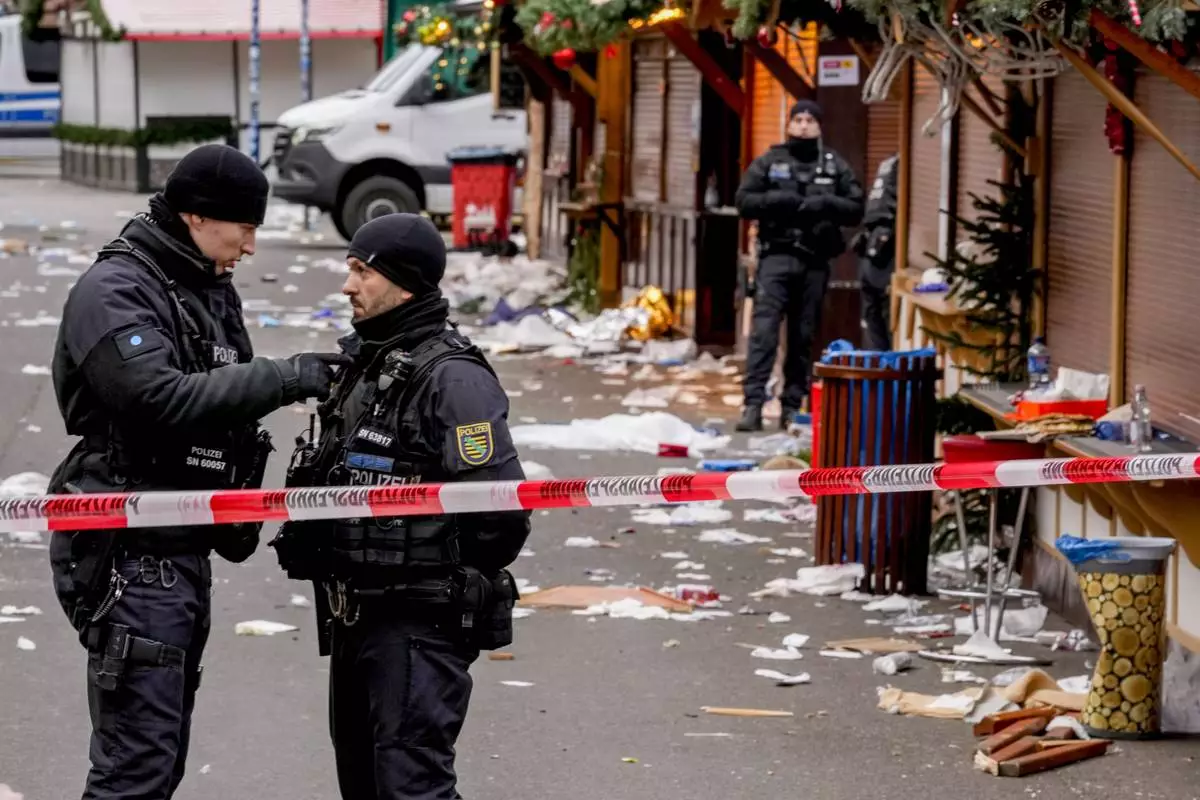
Policemen guard a Christmas Market, where a car drove into a crowd on Friday evening, in Magdeburg, Germany, Saturday, Dec. 21, 2024. (AP Photo/Michael Probst)
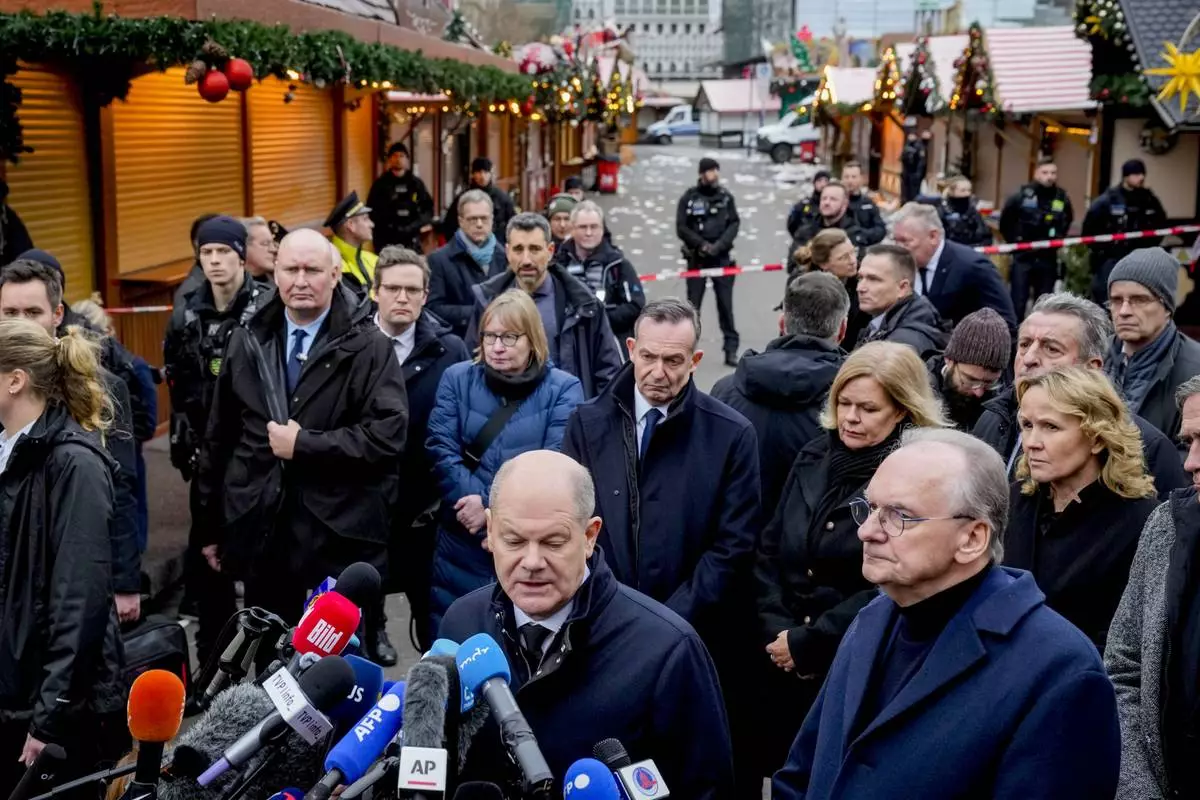
German Chancellor Olaf Scholz, centre, speaks at a Christmas Market, where a car drove into a crowd on Friday evening, in Magdeburg, Germany, Saturday, Dec. 21, 2024. (AP Photo/Michael Probst)
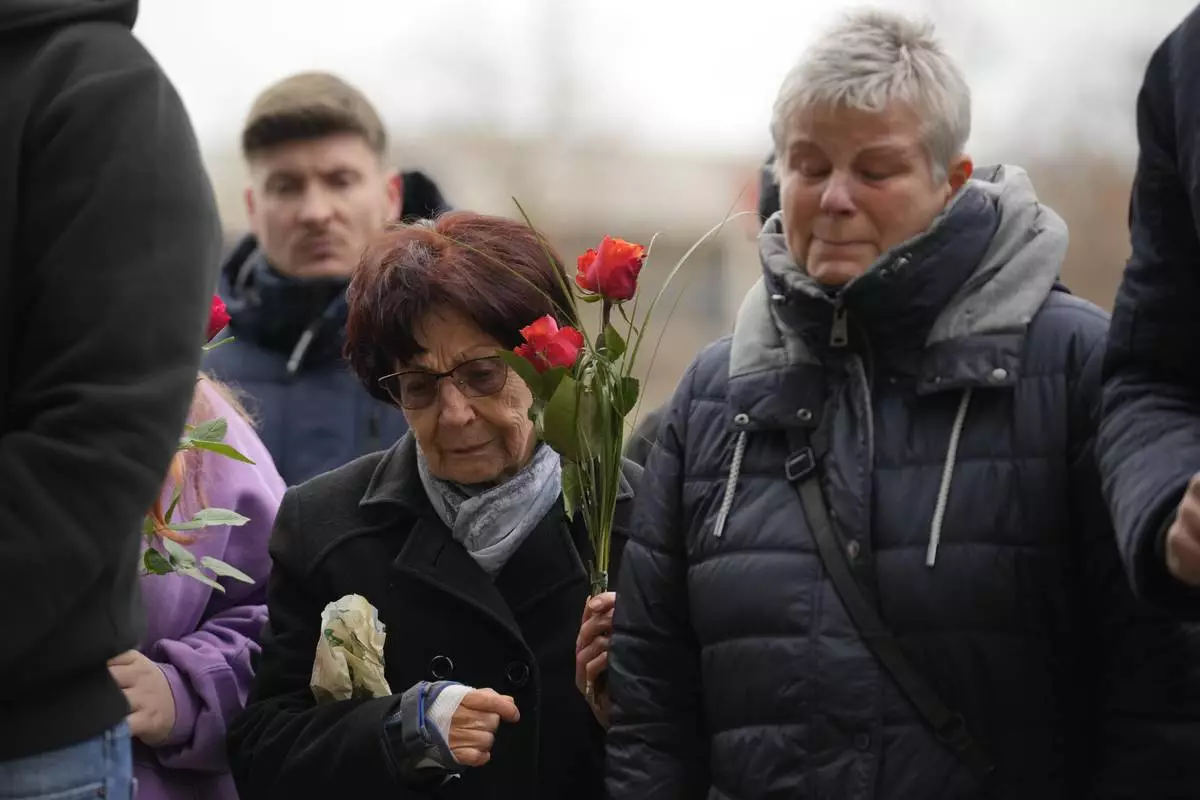
Citizens pay tribute to deaths outside St. John's Church near a Christmas Market, where a car drove into a crowd on Friday evening, in Magdeburg, Germany, Saturday, Dec. 21, 2024. (AP Photo/Ebrahim Noorozi)
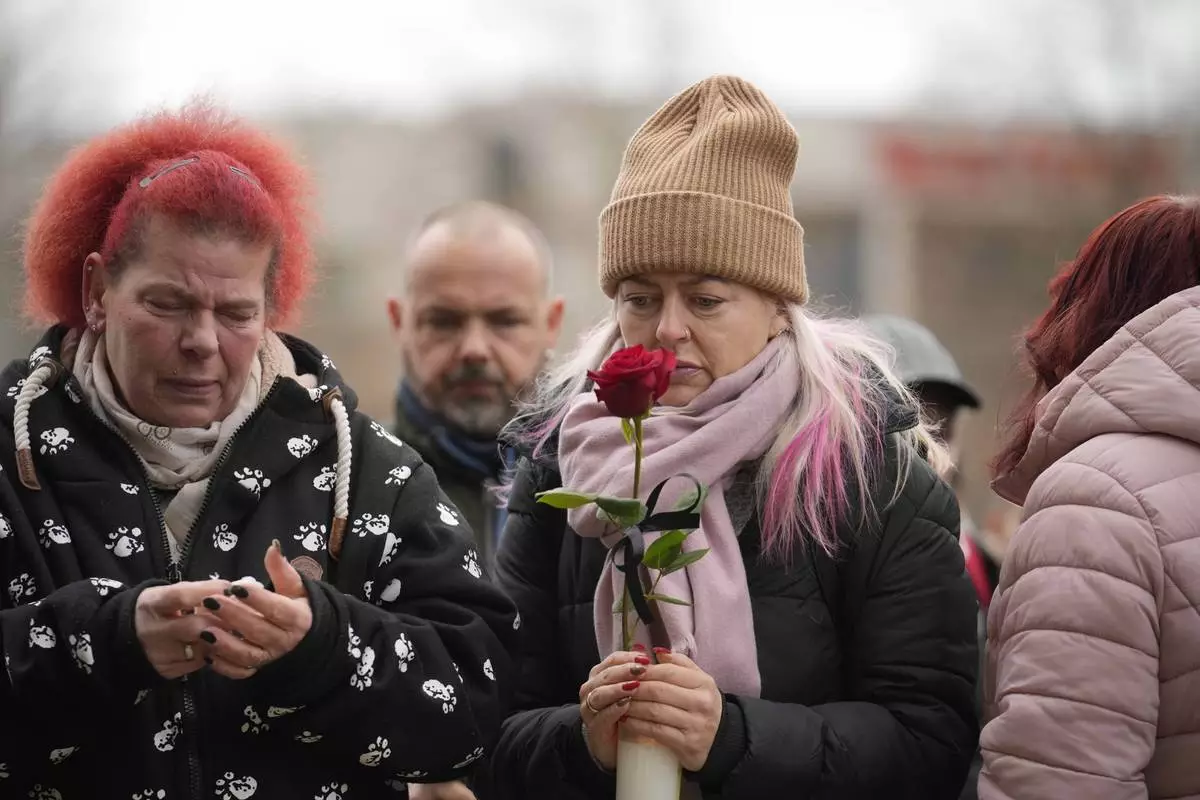
Citizens pay tribute and cry for deaths outside St. John's Church near a Christmas Market, where a car drove into a crowd on Friday evening, in Magdeburg, Germany, Saturday, Dec. 21, 2024. (AP Photo/Ebrahim Noorozi)

A policeman, right, stands on a Christmas Market, where a car drove into a crowd on Friday evening, in Magdeburg, Germany, Saturday, Dec. 21, 2024. (AP Photo/Michael Probst)
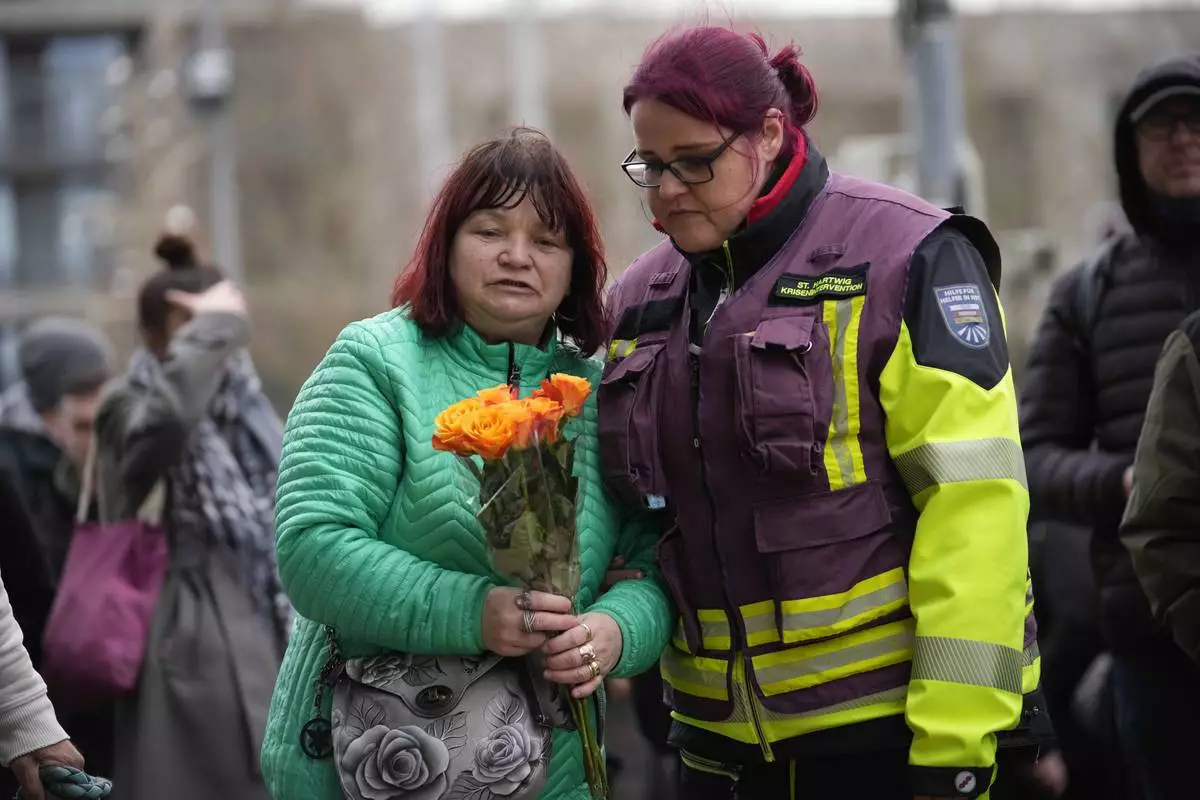
Citizens pay tribute to deaths outside St. John's Church near a Christmas Market, where a car drove into a crowd on Friday evening, in Magdeburg, Germany, Saturday, Dec. 21, 2024. (AP Photo/Ebrahim Noorozi)
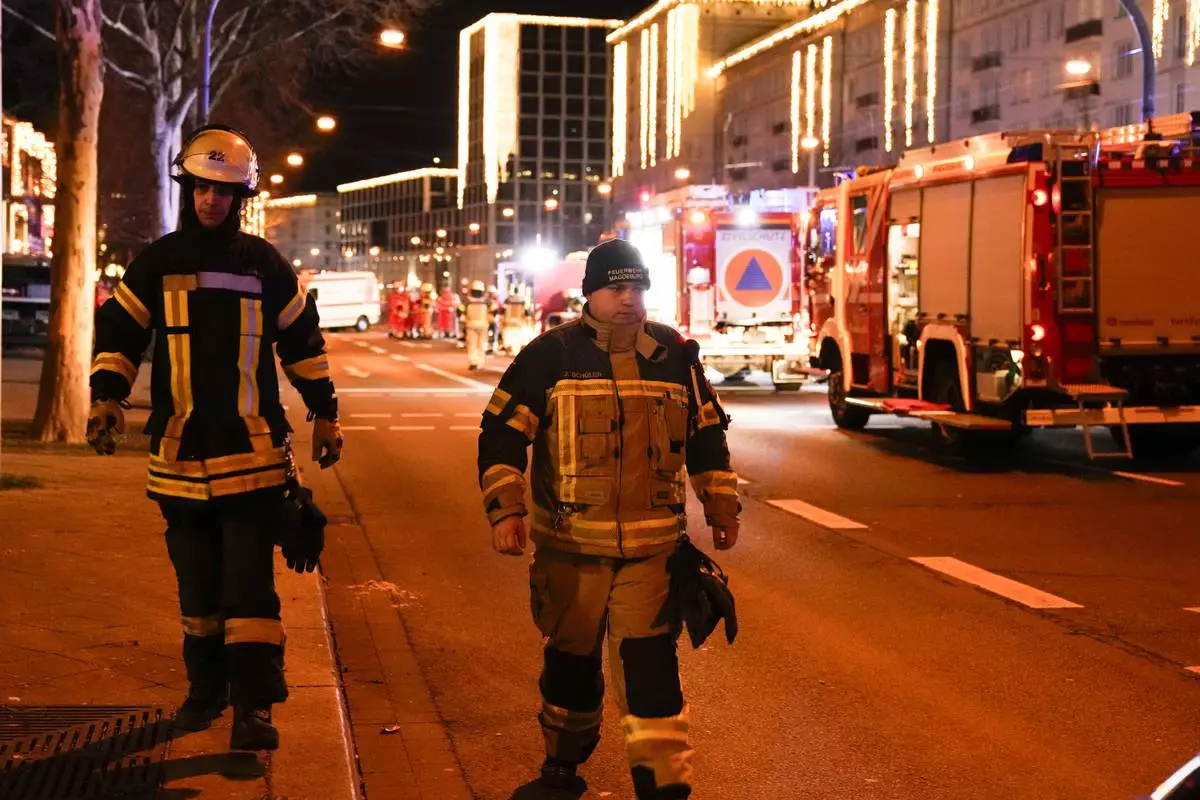
Two firefighters walk through a cordoned-off area near a Christmas Market, after a car drove into a crowd in Magdeburg, Germany, Saturday, Dec. 21, 2024. (AP Photo/Ebrahim Noroozi)
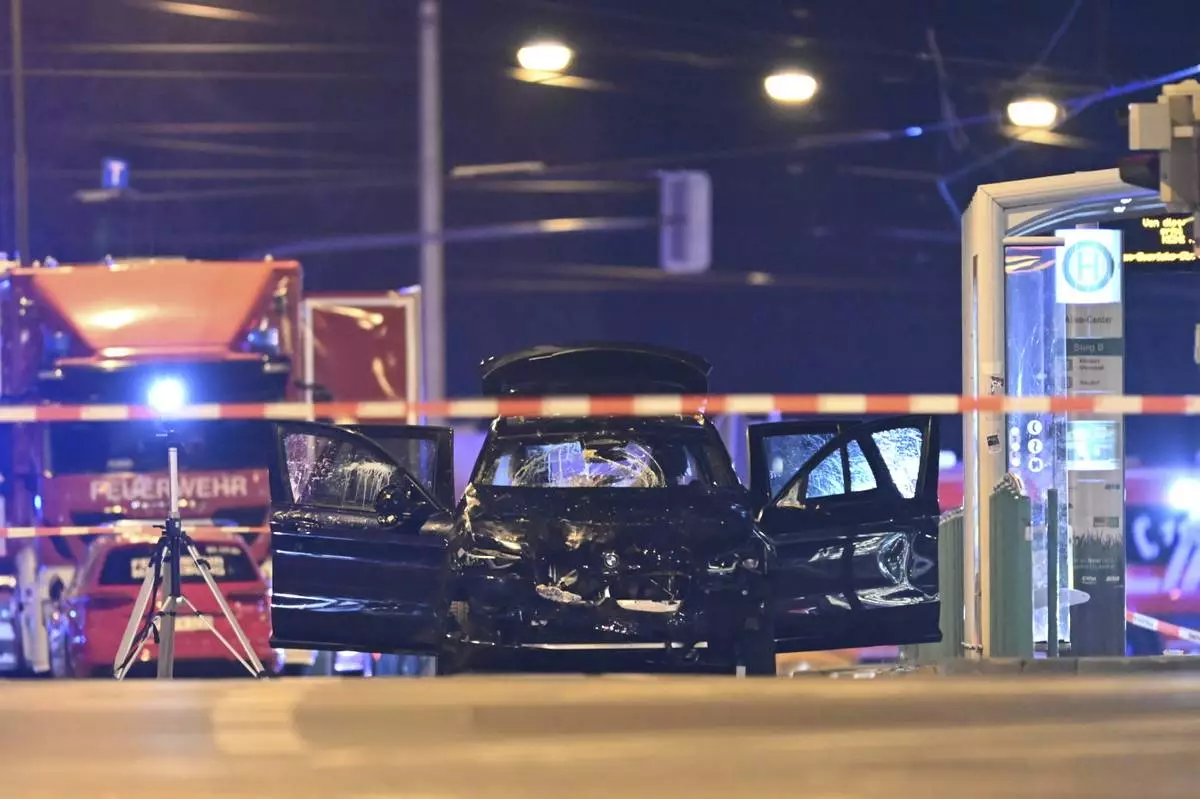
A damaged car sits with its doors open after a driver plowed into a busy Christmas market in Magdeburg, Germany, early Saturday, Dec. 21, 2024. (Hendrik Schmidt/dpa via AP)
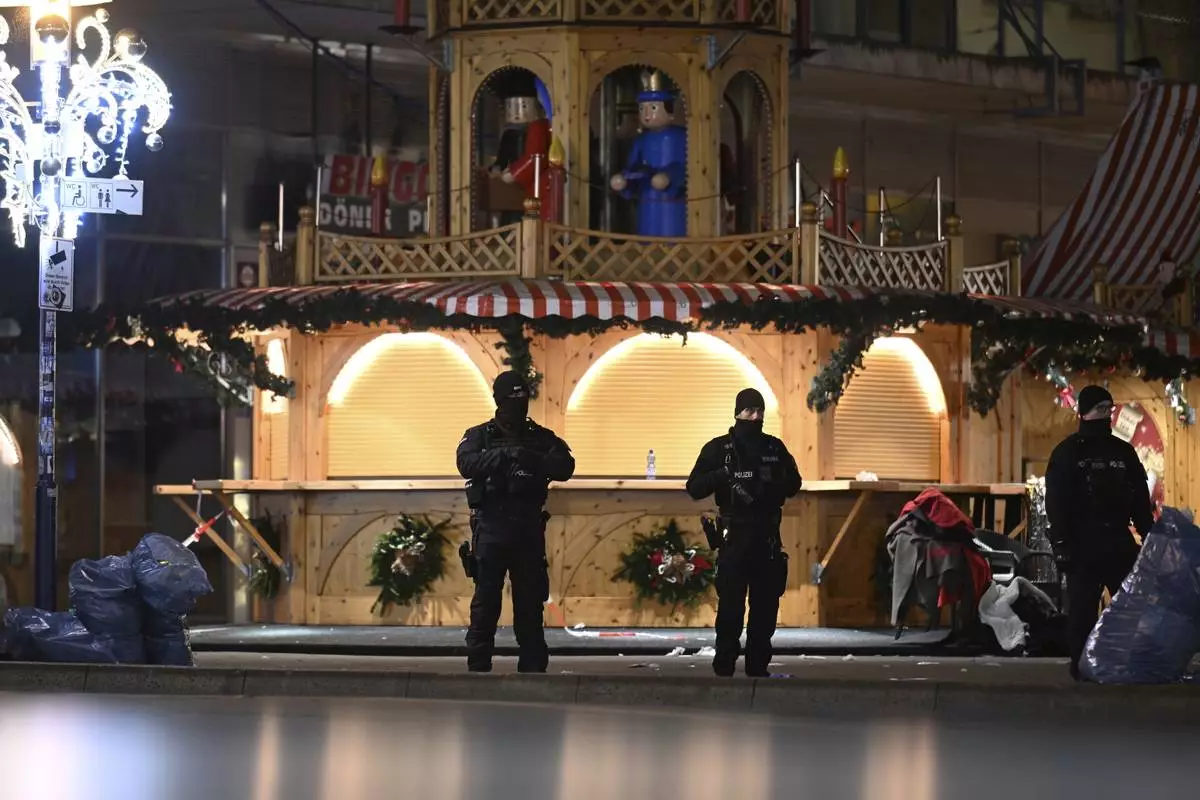
Police stand at a Christmas market in Magdeburg, Germany, early Saturday, Dec. 21, 2024, after a driver plowed into a group of people at the market late Friday. (Hendrik Schmidt/dpa via AP)

Police stand at a Christmas market in Magdeburg, Germany, early Saturday, Dec. 21, 2024, after a driver plowed into a group of people at the market late Friday. (Hendrik Schmidt/dpa via AP)
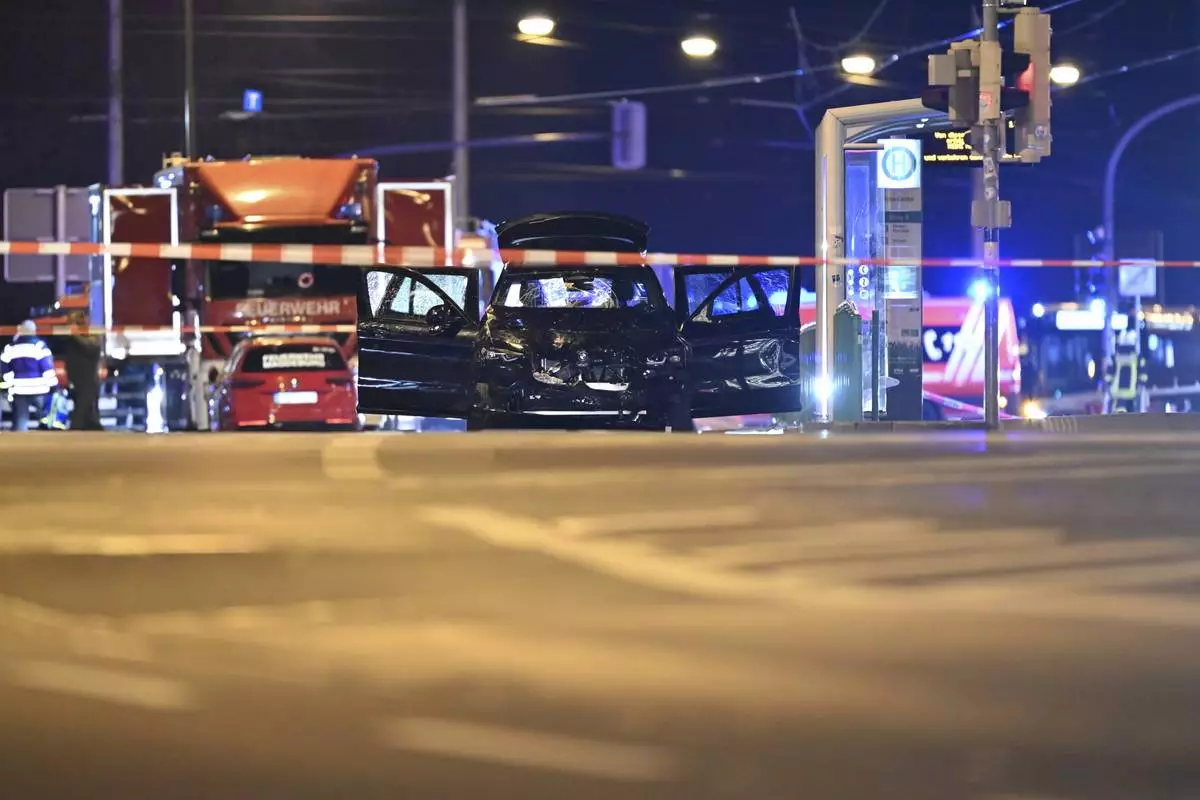
A damaged car sits with its doors open after a driver plowed into a busy Christmas market in Magdeburg, Germany, early Saturday, Dec. 21, 2024. (Hendrik Schmidt/dpa via AP)
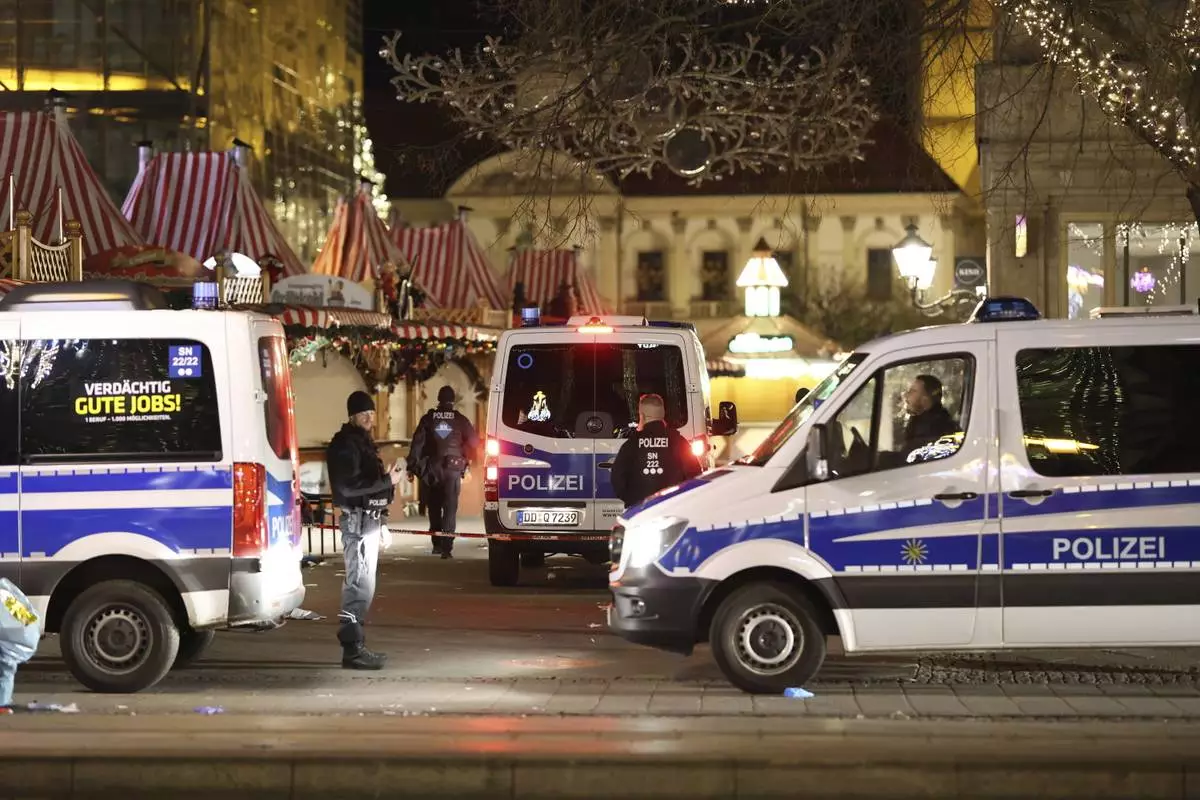
Police officers and police emergency vehicles are seen at the Christmas market in Magdeburg after a driver plowed into a busy Christmas market in Magdeburg, Germany, Saturday, Dec. 21, 2024. (Matthias Bein/dpa via AP)
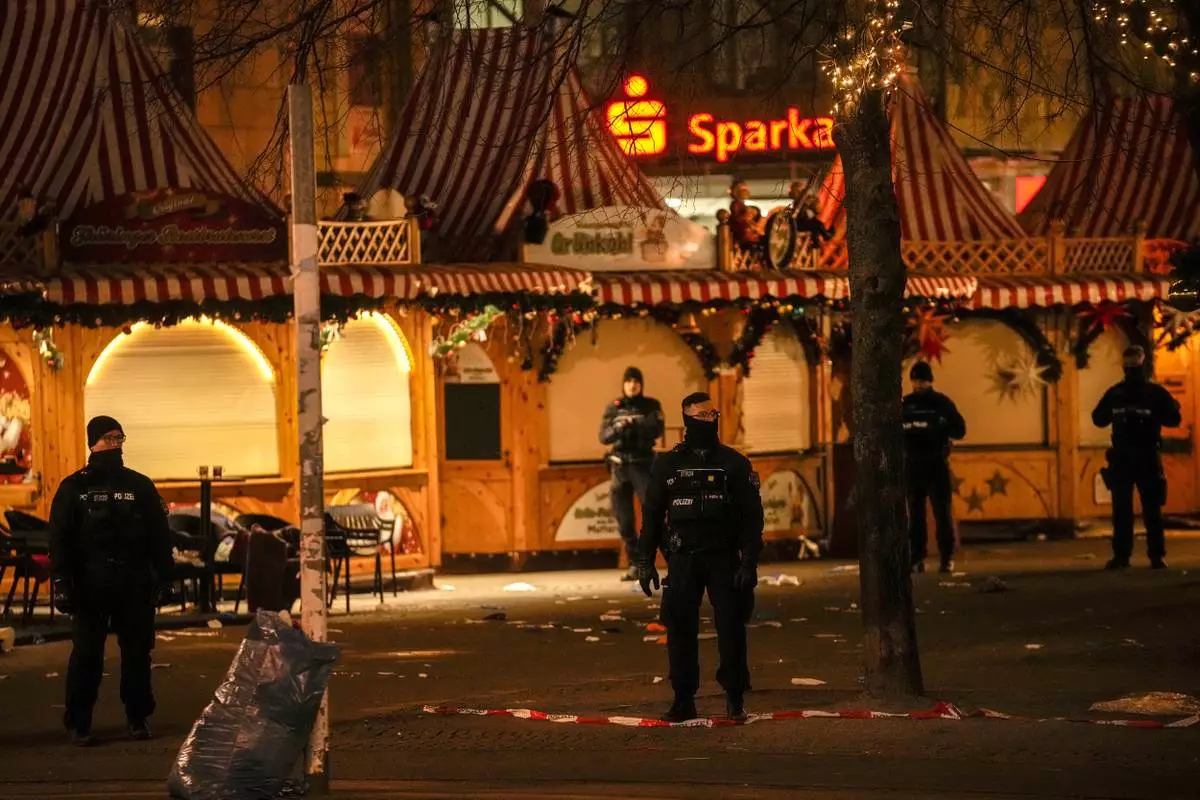
Security guards stand in front of a cordoned-off Christmas Market after a car crashed into a crowd of people, in Magdeburg, Germany, Saturday early morning, Dec. 21, 2024. (AP Photo/Ebrahim Noroozi)
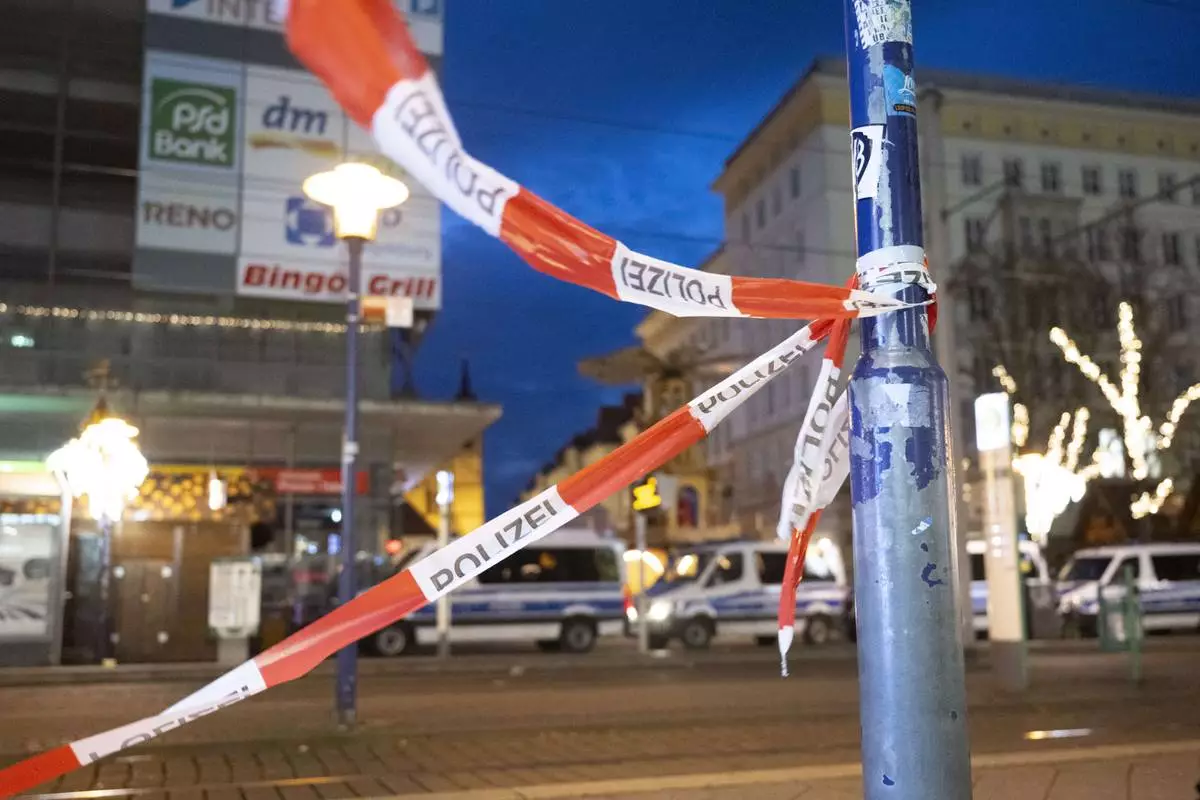
A barrier tape and police vehicles are seen in front of the entrance to the Christmas market in Magdeburg after a driver plowed into a busy Christmas market in Magdeburg, Germany, Saturday, Dec. 21, 2024. (Sebastian Kahnert/dpa via AP)
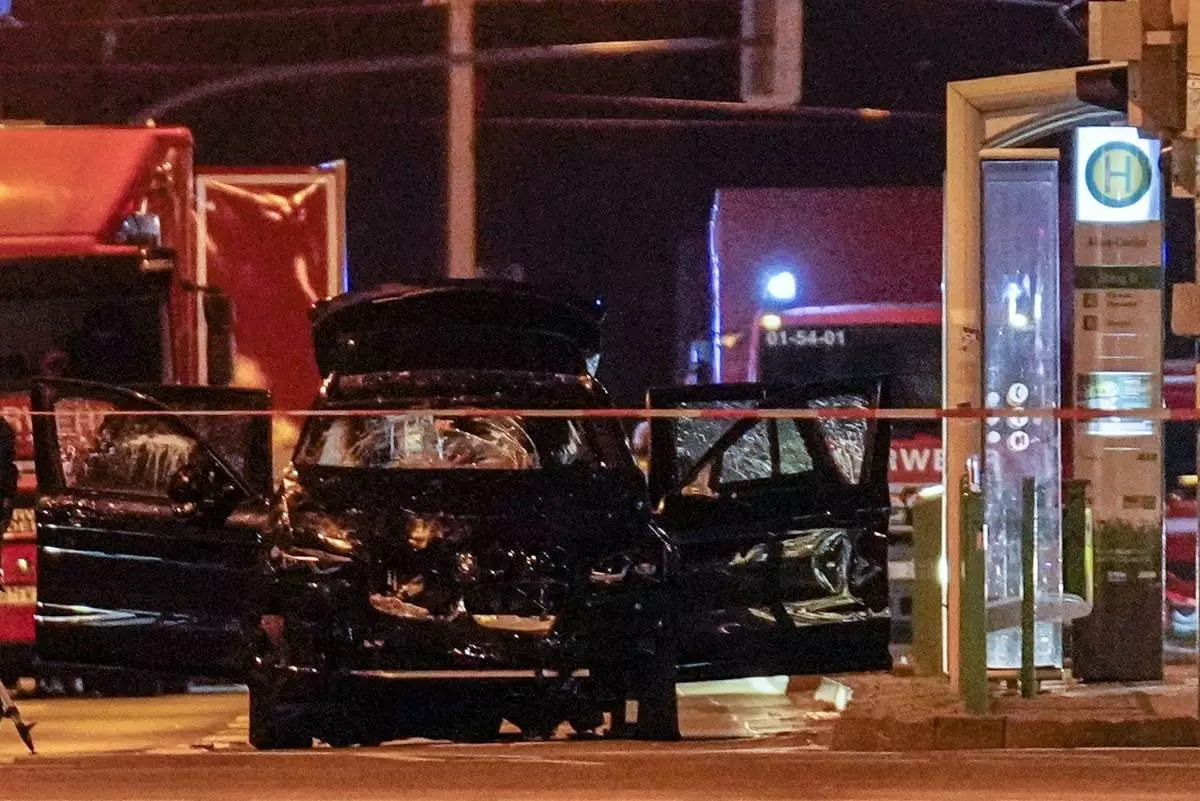
The car that was crashed into a crowd of people at the Magdeburg Christmas market is seen following the attack in Magdeburg, Germany, Saturday early morning, Dec. 21, 2024. (AP Photo/Ebrahim Noroozi)
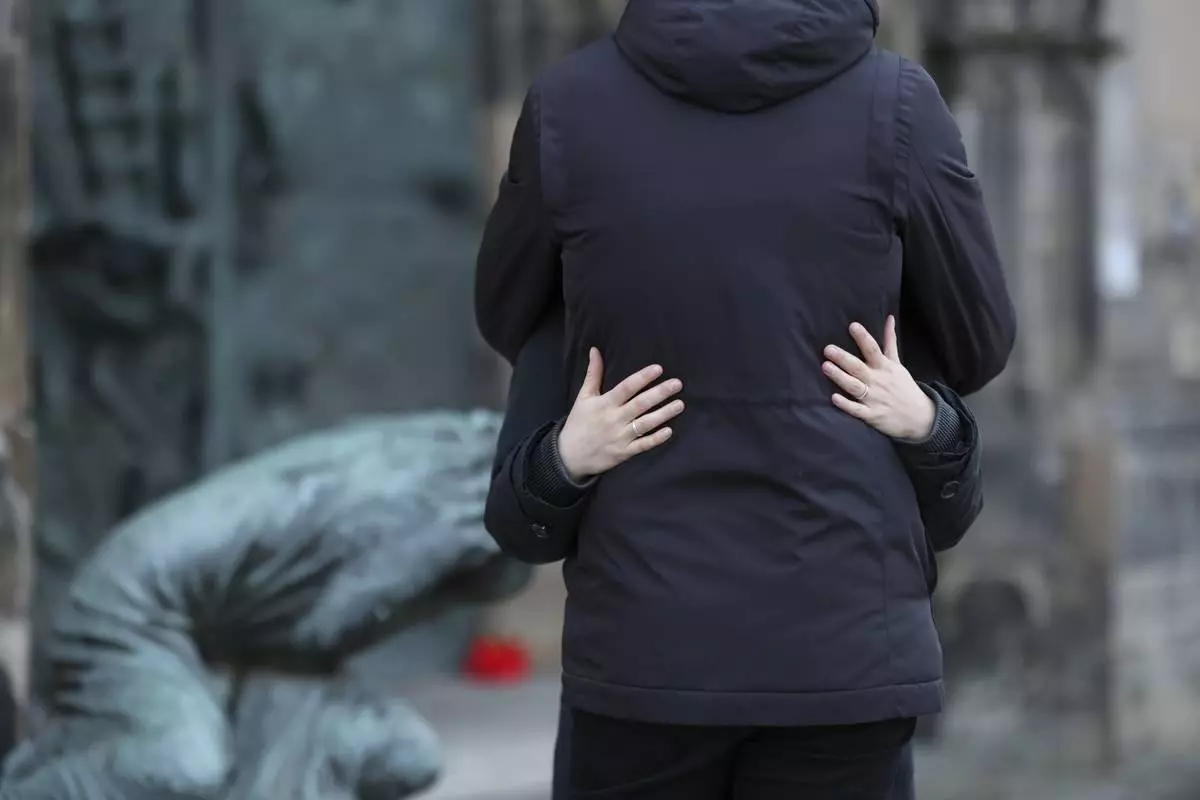
People mourn in front of St. John's Church for the victims of Friday's attack at the Christmas market in Magdeburg, Germany, Saturday, Dec. 21, 2024. (Matthias Bein/dpa via AP)
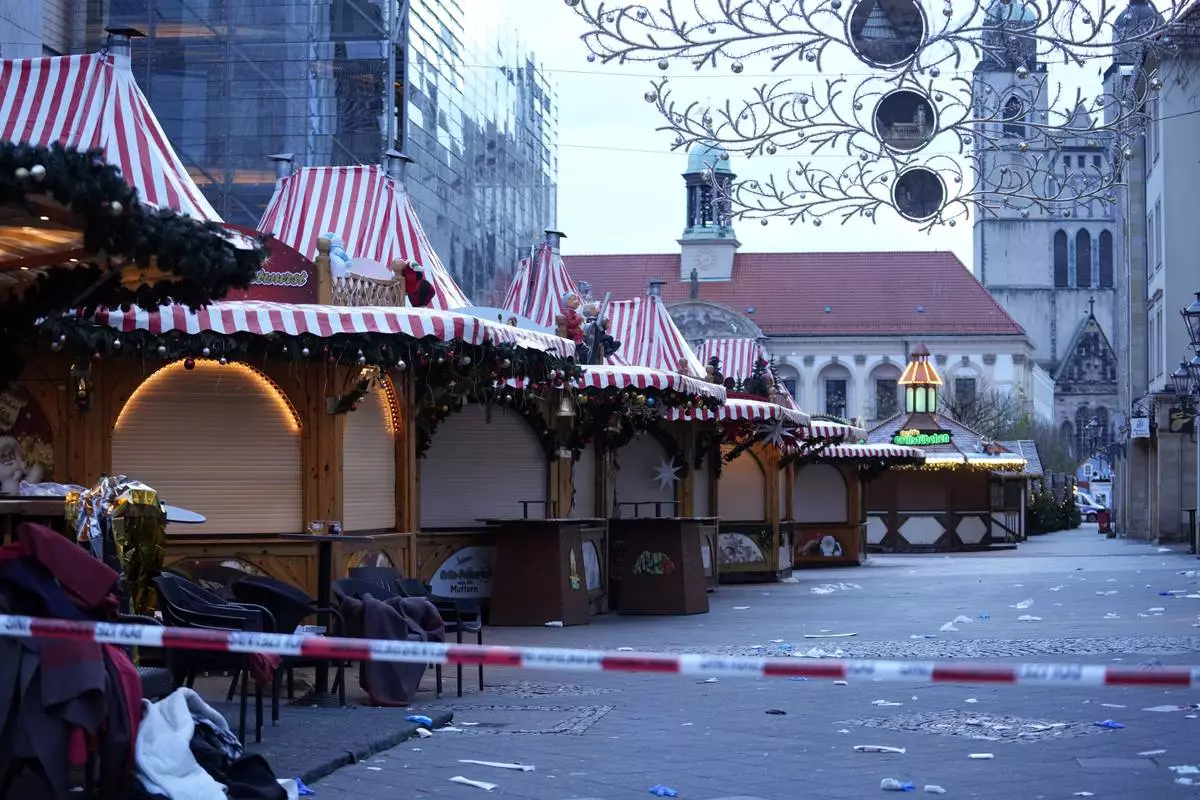
Police tape cordons-off a Christmas Market, where a car drove into a crowd on Friday evening, in Magdeburg, Germany, Saturday, Dec. 21, 2024. (AP Photo/Ebrahim Noroozi)
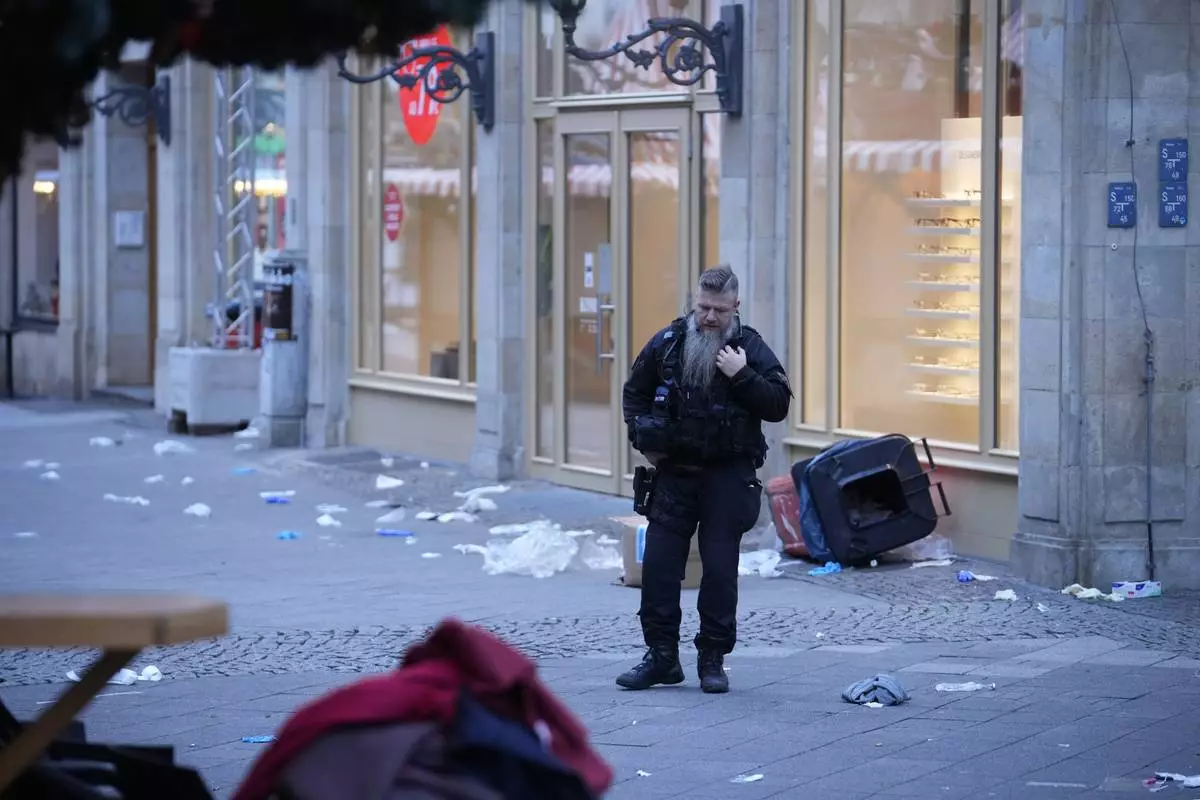
A police officer stands guard at at a cordoned-off area near a Christmas Market, where a car drove into a crowd on Friday evening, in Magdeburg, Germany, Saturday, Dec. 21, 2024. (AP Photo/Ebrahim Noroozi)
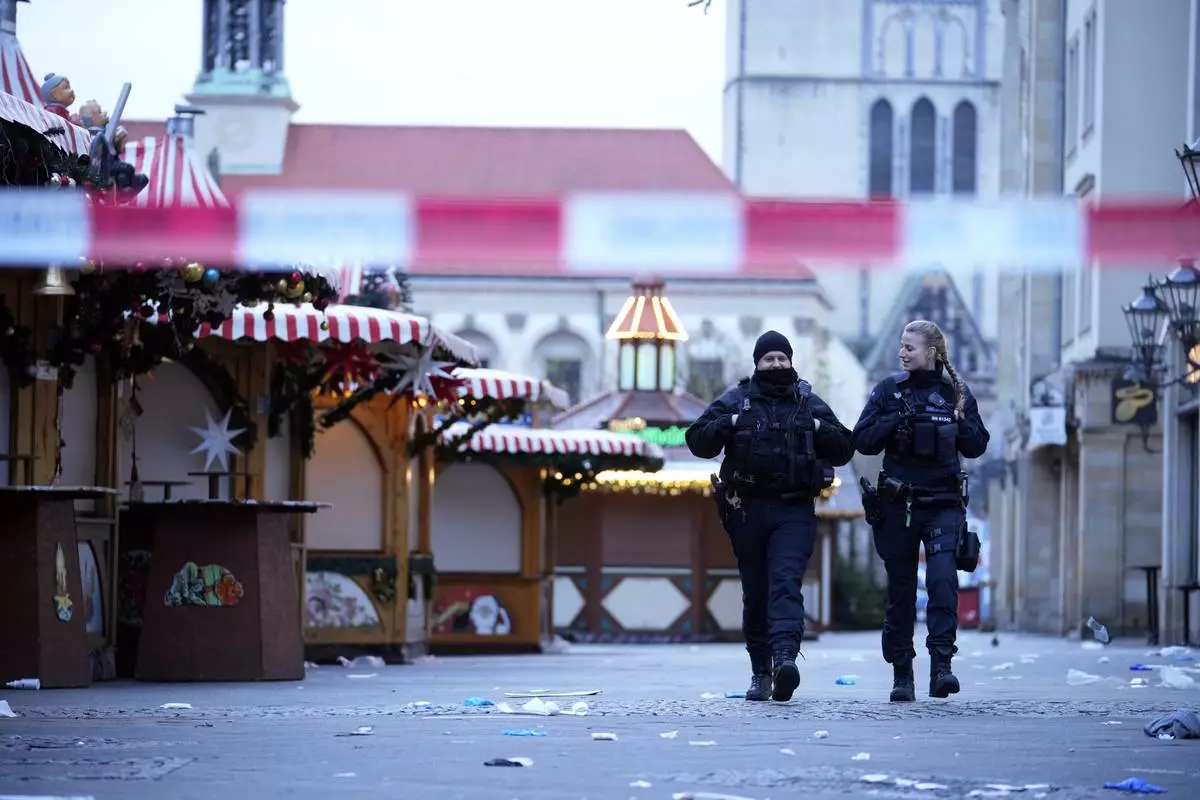
Police officers patrol a cordoned-off area at a Christmas Market, where a car drove into a crowd on Friday evening, in Magdeburg, Germany, Saturday, Dec. 21, 2024. (AP Photo/Ebrahim Noroozi)
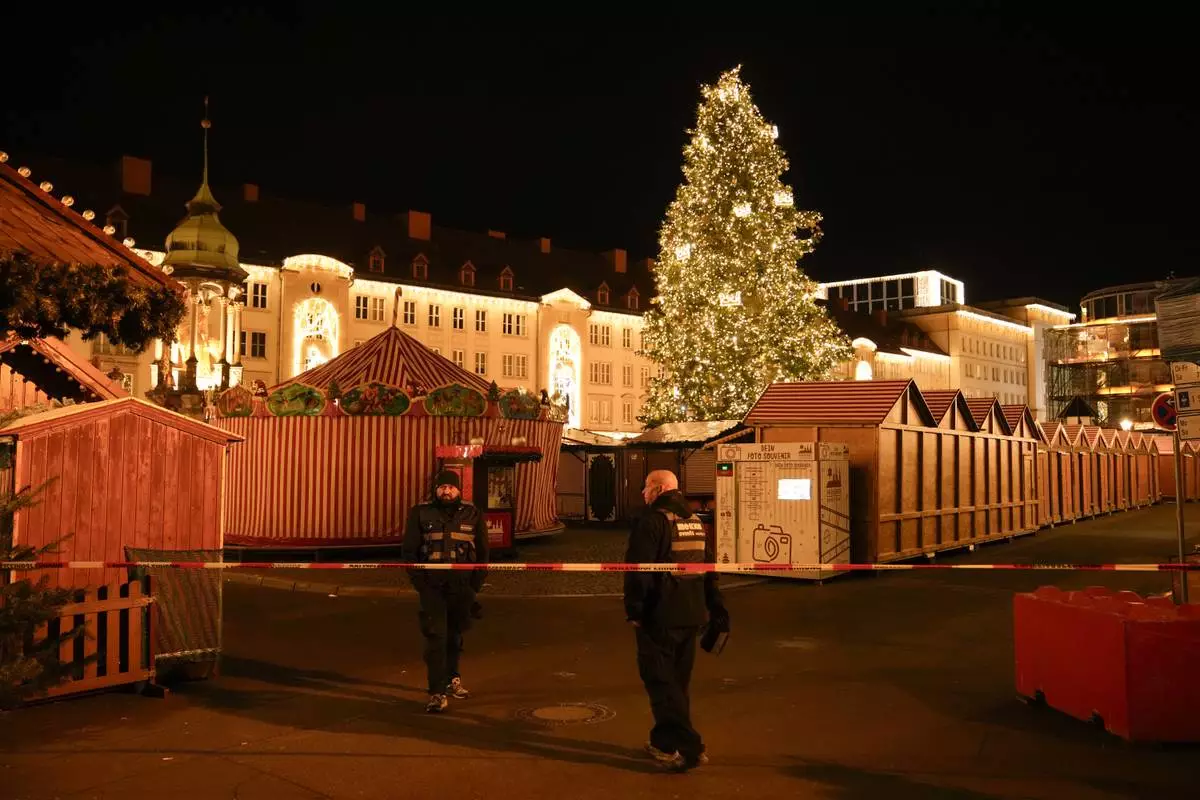
Security guards stand in front of a cordoned-off Christmas Market after a car crashed into a crowd of people, in Magdeburg, Germany, Saturday, Dec. 21, 2024. (AP Photo/Ebrahim Noroozi)
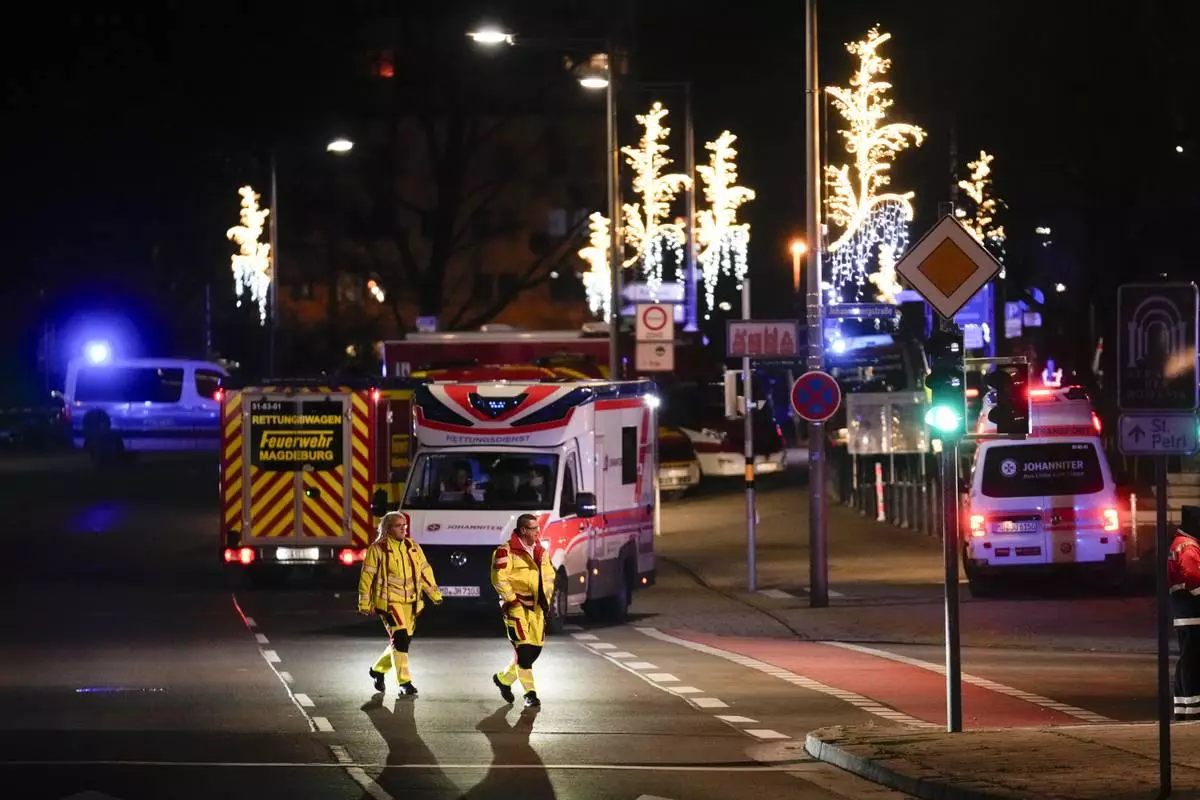
Emergency services work in a cordoned-off area near a Christmas Market, after a car drove into a crowd in Magdeburg, Germany, Saturday, Dec. 21, 2024. (AP Photo/Ebrahim Noroozi)
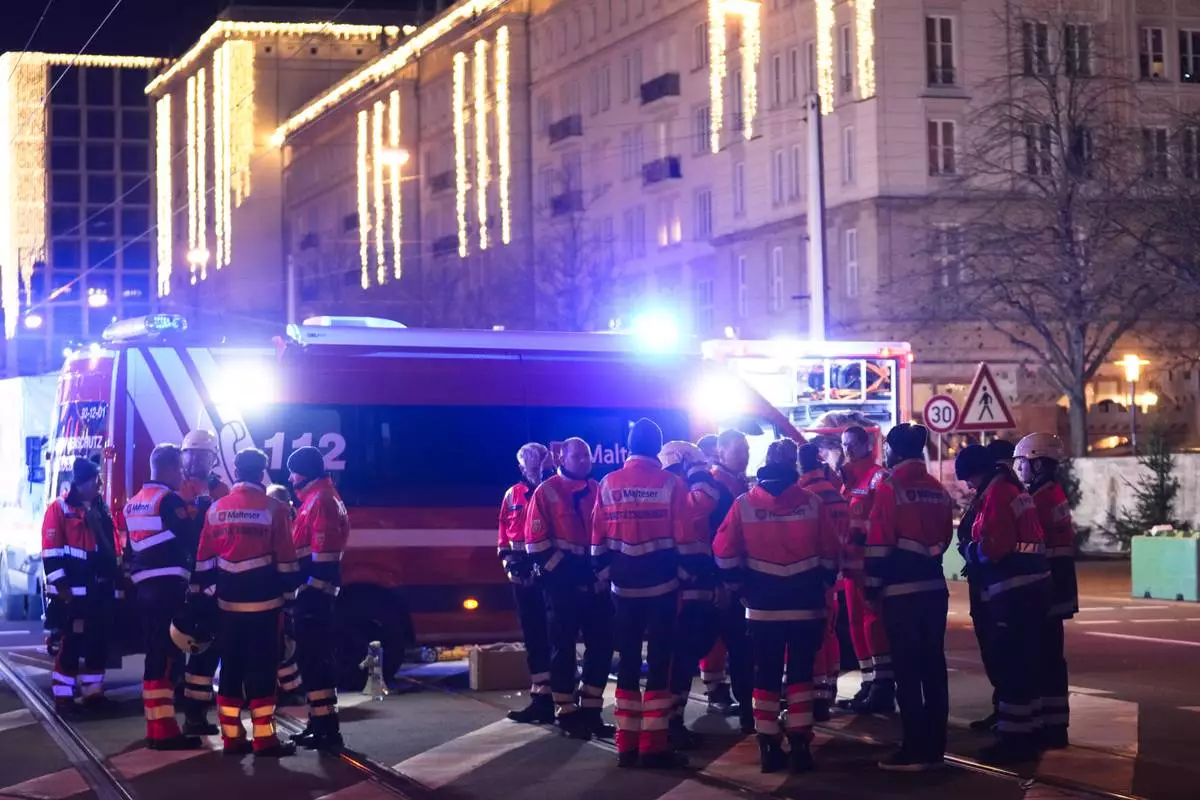
Emergency services work in a cordoned-off area near a Christmas Market, after a car drove into a crowd in Magdeburg, Germany, Friday, Dec. 20, 2024. (AP Photo/Ebrahim Noroozi)
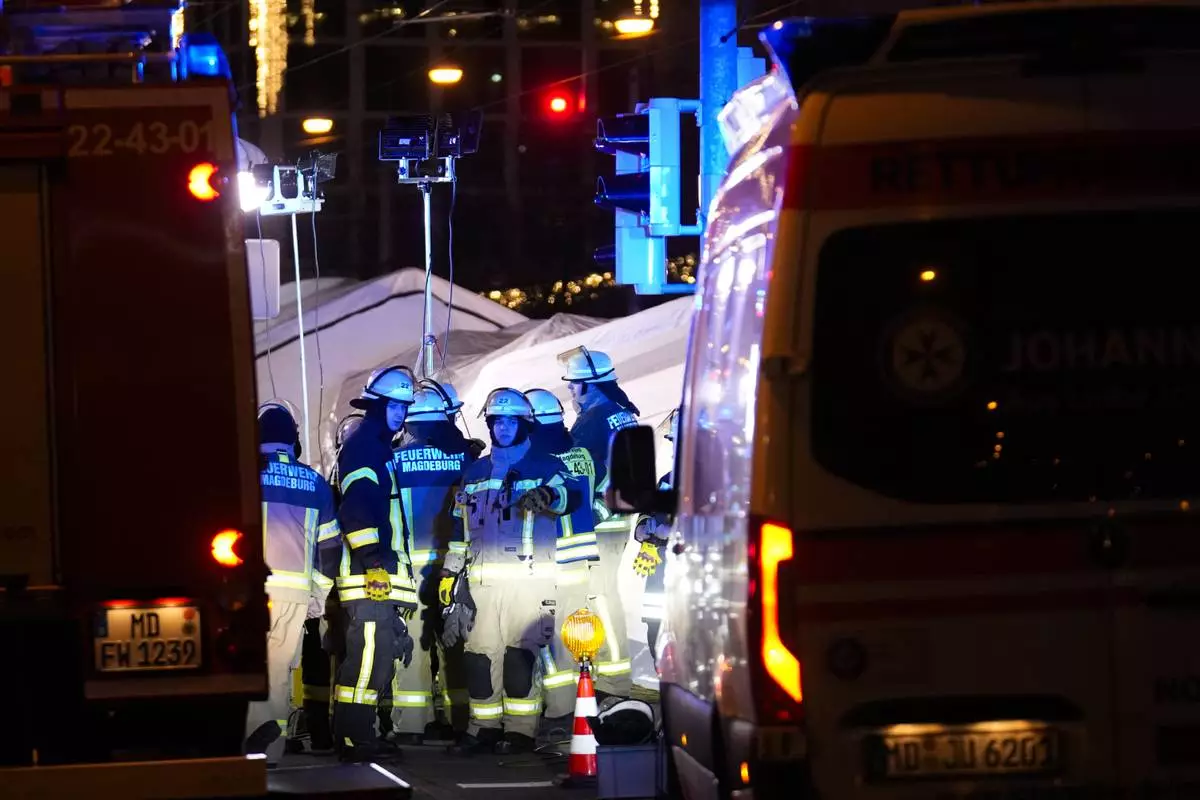
Emergency services work in a cordoned-off area near a Christmas Market, after a car drove into a crowd in Magdeburg, Germany, Friday, Dec. 20, 2024. (AP Photo/Ebrahim Noroozi)
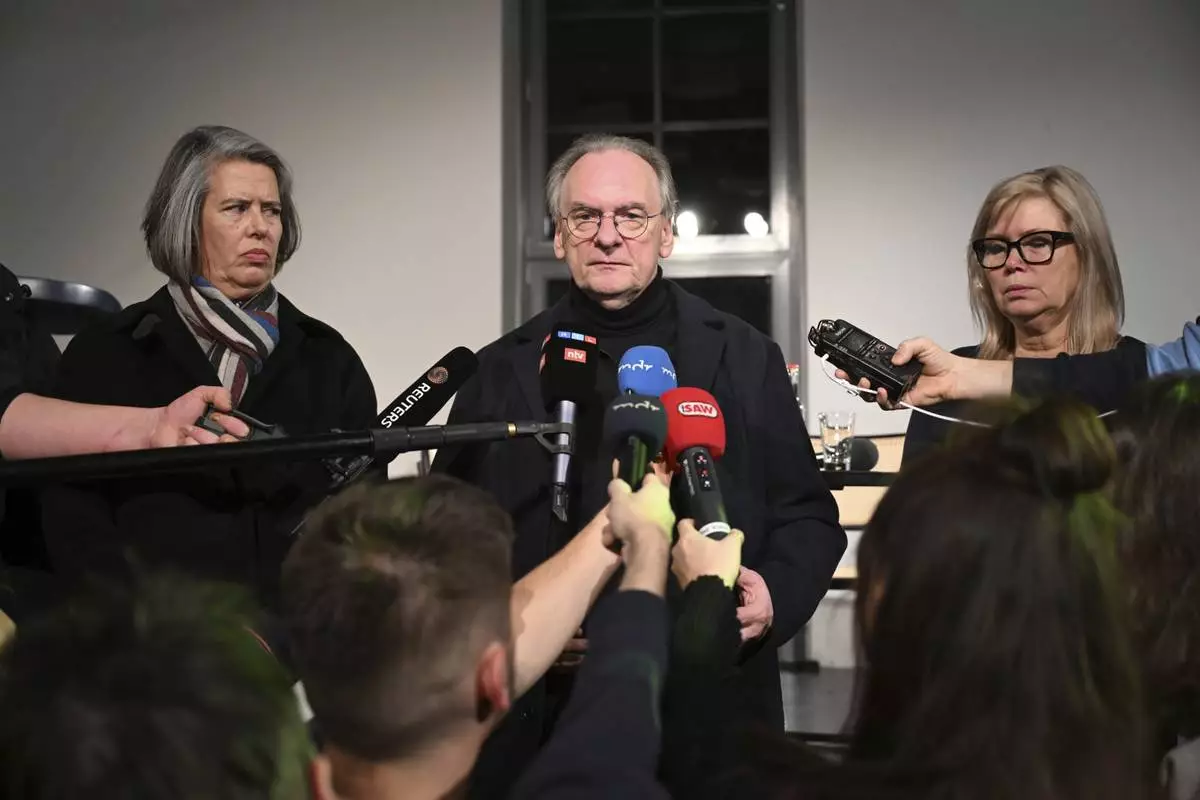
Reiner Haseloff, Minister President of Saxony-Anhalt, center, is flanked by Tamara Zieschang, Minister of the Interior and Sport of Saxony-Anhalt, left, and Simone Borris, Mayor of the City of Magdeburg, at a press conference after a car plowed into a busy outdoor Christmas market in Magdeburg, Germany Friday, Dec. 20, 2024. (Hendrik Schmidt/dpa via AP)
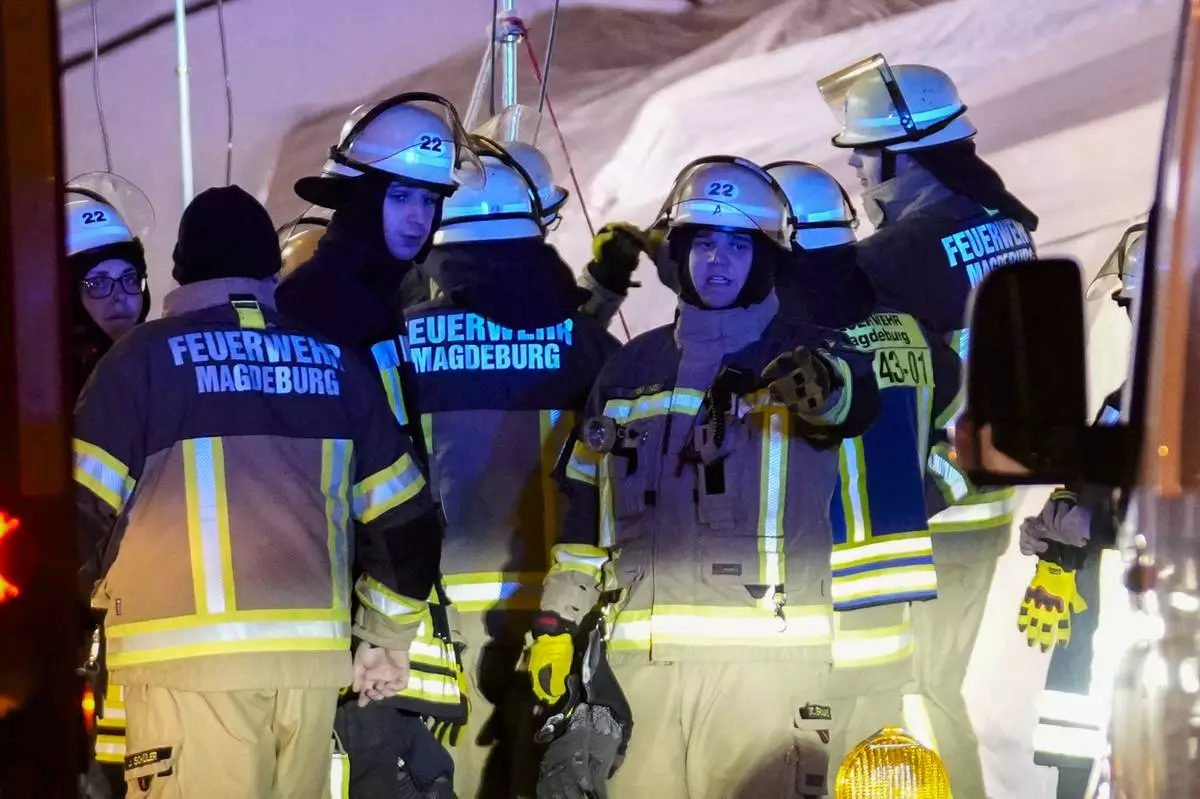
Emergency services work in a cordoned-off area near a Christmas Market, after a car drove into a crowd in Magdeburg, Germany, Friday, Dec. 20, 2024. (AP Photo/Ebrahim Noroozi)
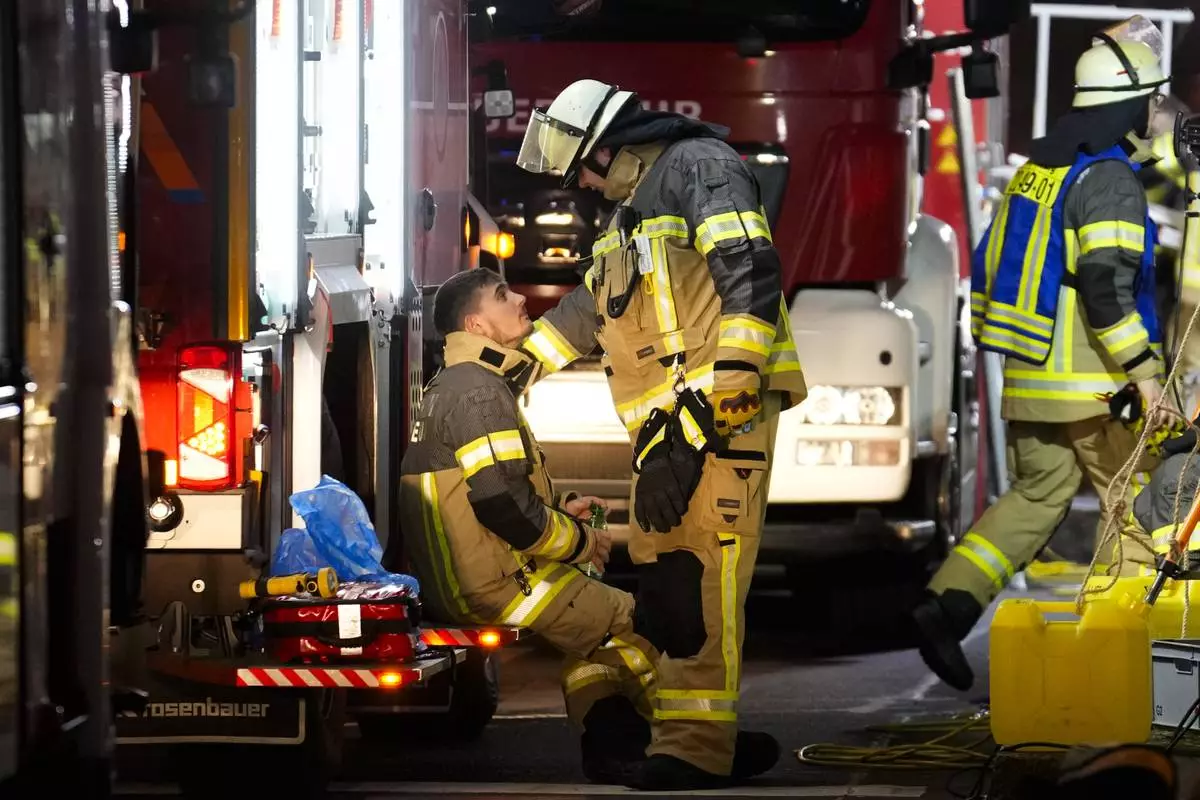
Emergency services work in a cordoned-off area near a Christmas Market, after a car drove into a crowd in Magdeburg, Germany, Friday, Dec. 20, 2024. (AP Photo/Ebrahim Noroozi)
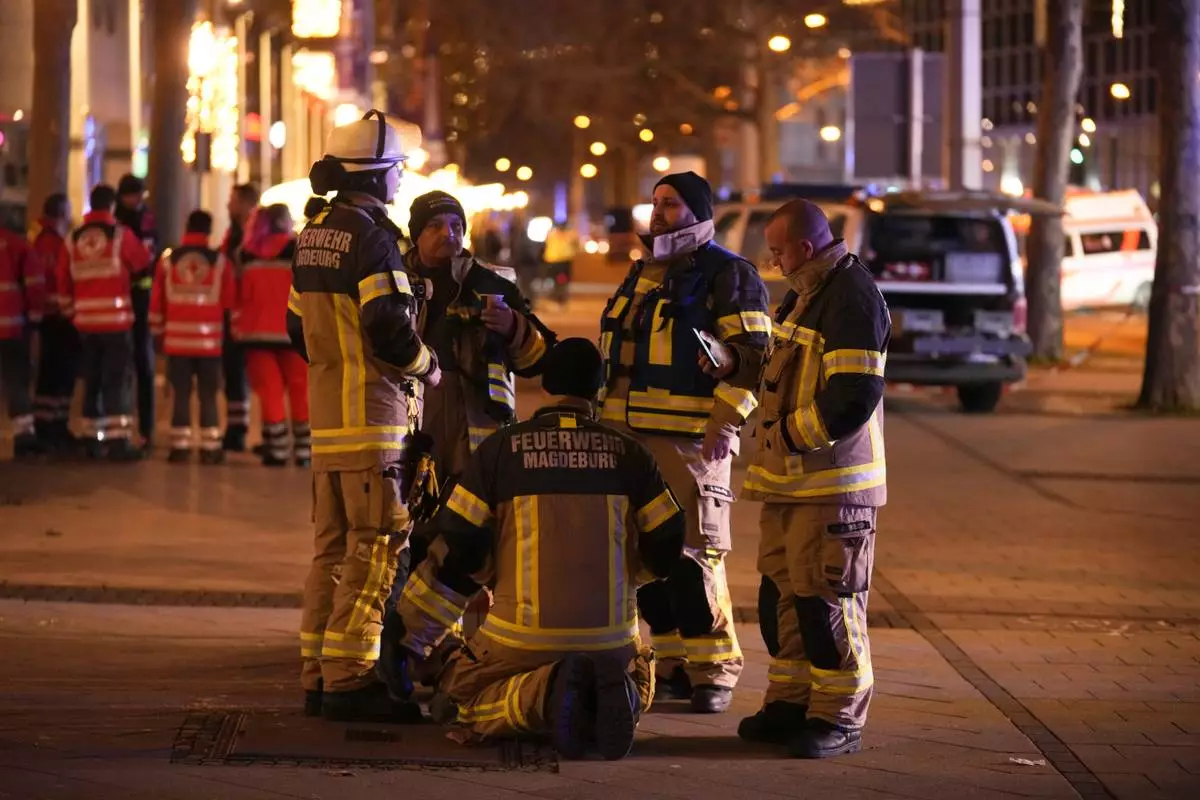
Emergency services work in a cordoned-off area near a Christmas Market, after a car drove into a crowd in Magdeburg, Germany, Friday, Dec. 20, 2024. (AP Photo/Ebrahim Noroozi)

A police officer guards at a blocked road near a Christmas Market, after an incident in Magdeburg, Germany, Friday, Dec. 20, 2024. (AP Photo/Ebrahim Noroozi)
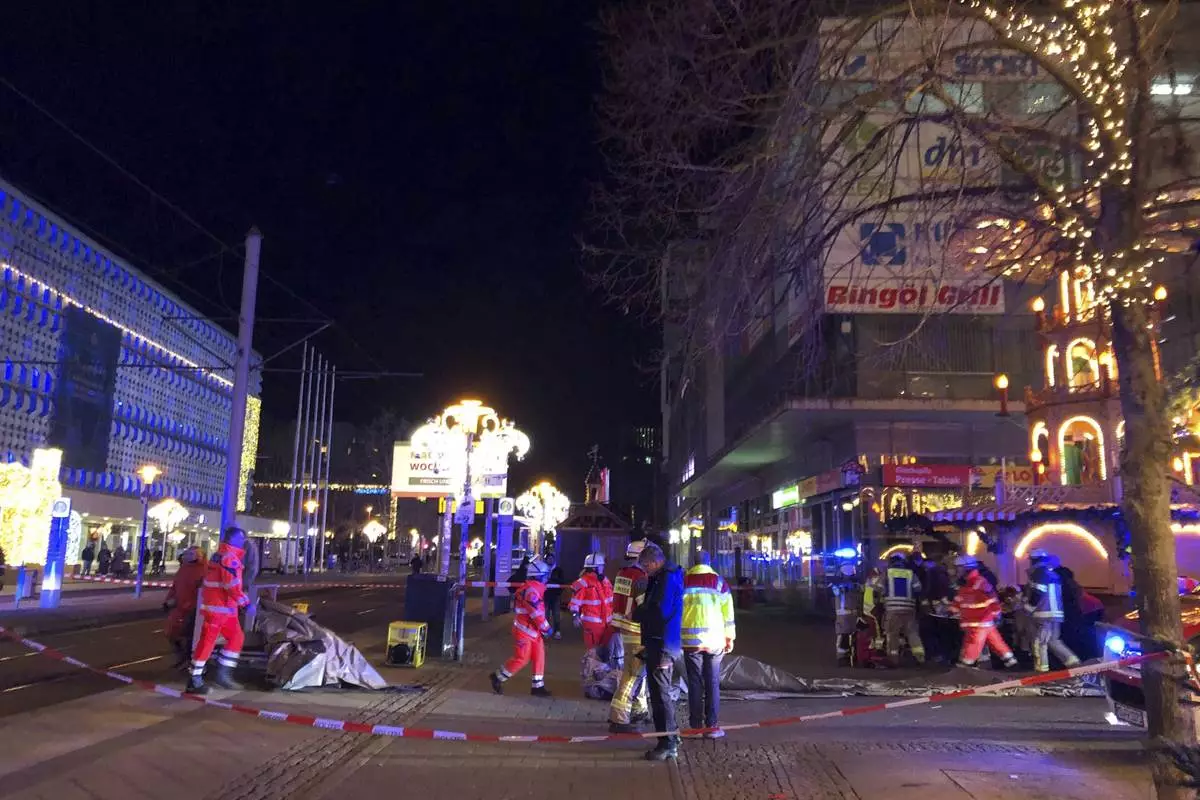
Emergency services attend an incident at the Christmas market in Magdeburg, Germany, Friday Dec. 20, 2024. (Dörthe Hein/dpa via AP)
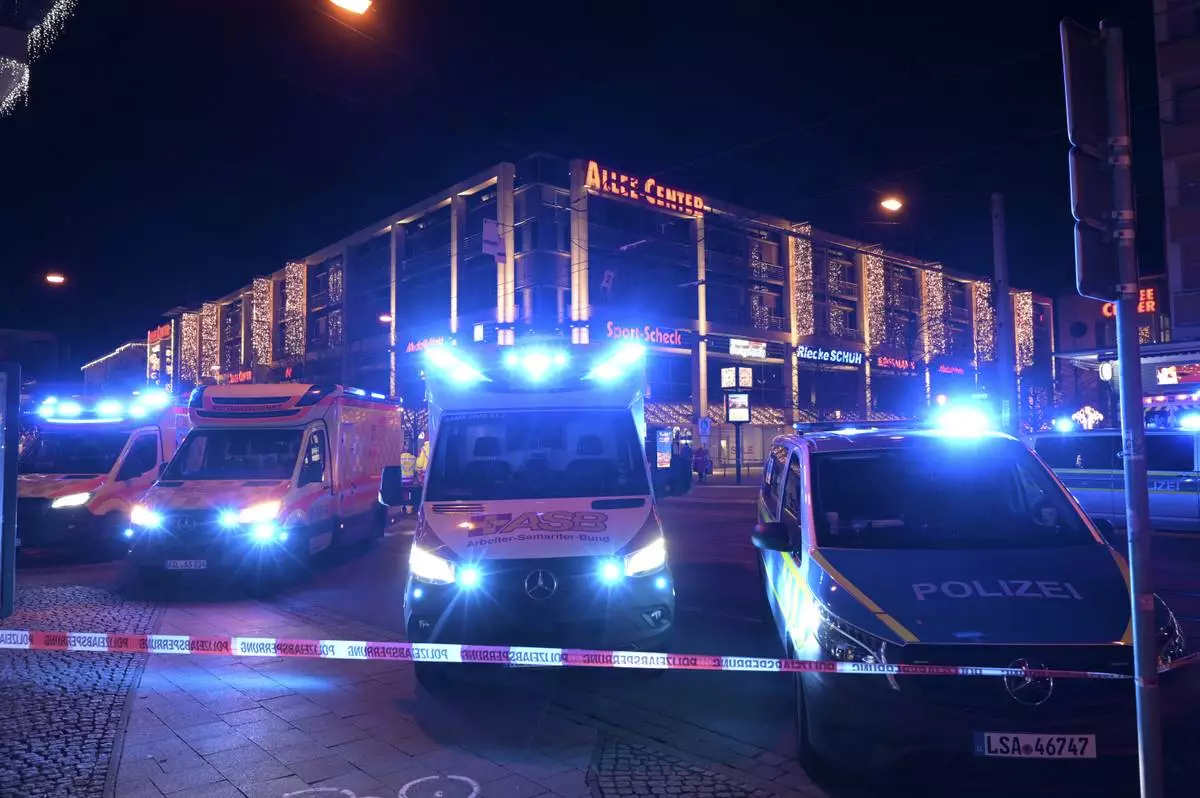
Emergency services attend an incident at the Christmas market in Magdeburg, Germany, Friday Dec. 20, 2024. (Heiko Rebsch/dpa via AP)
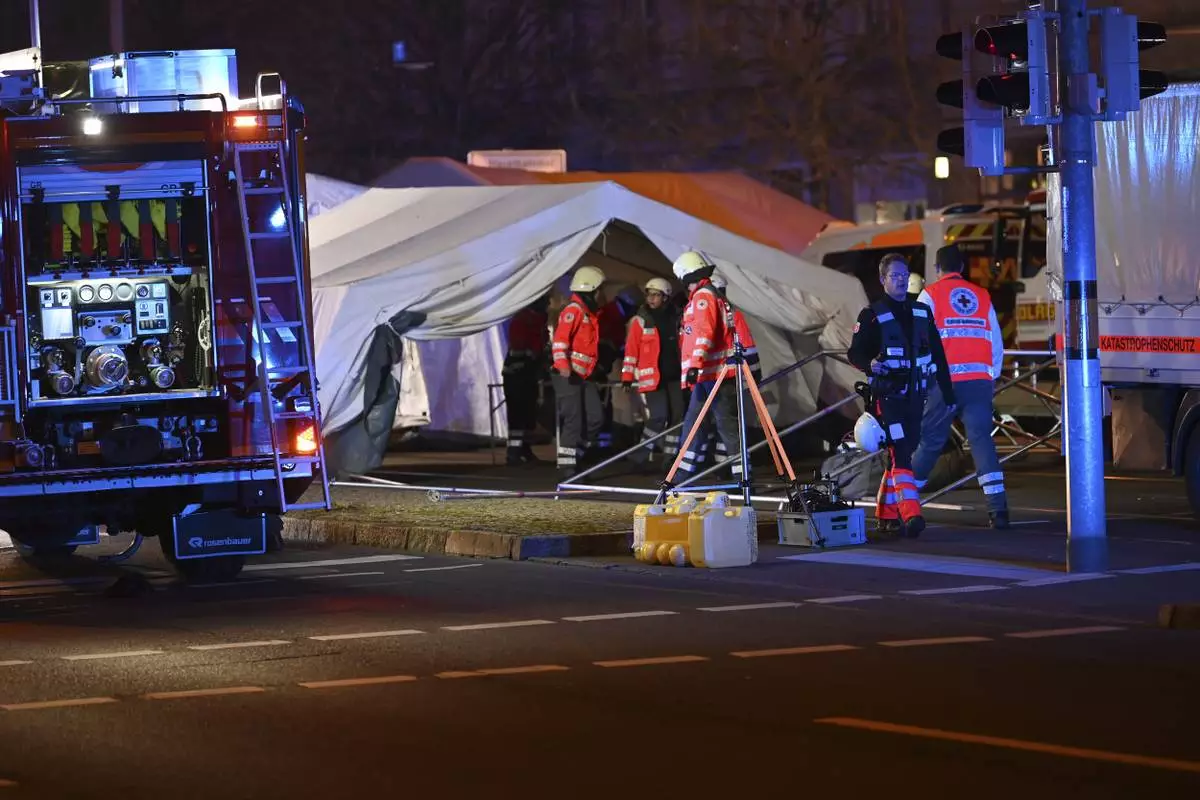
Emergency services attend an incident at the Christmas market in Magdeburg, Germany, Friday Dec. 20, 2024. (Heiko Rebsch/dpa via AP)
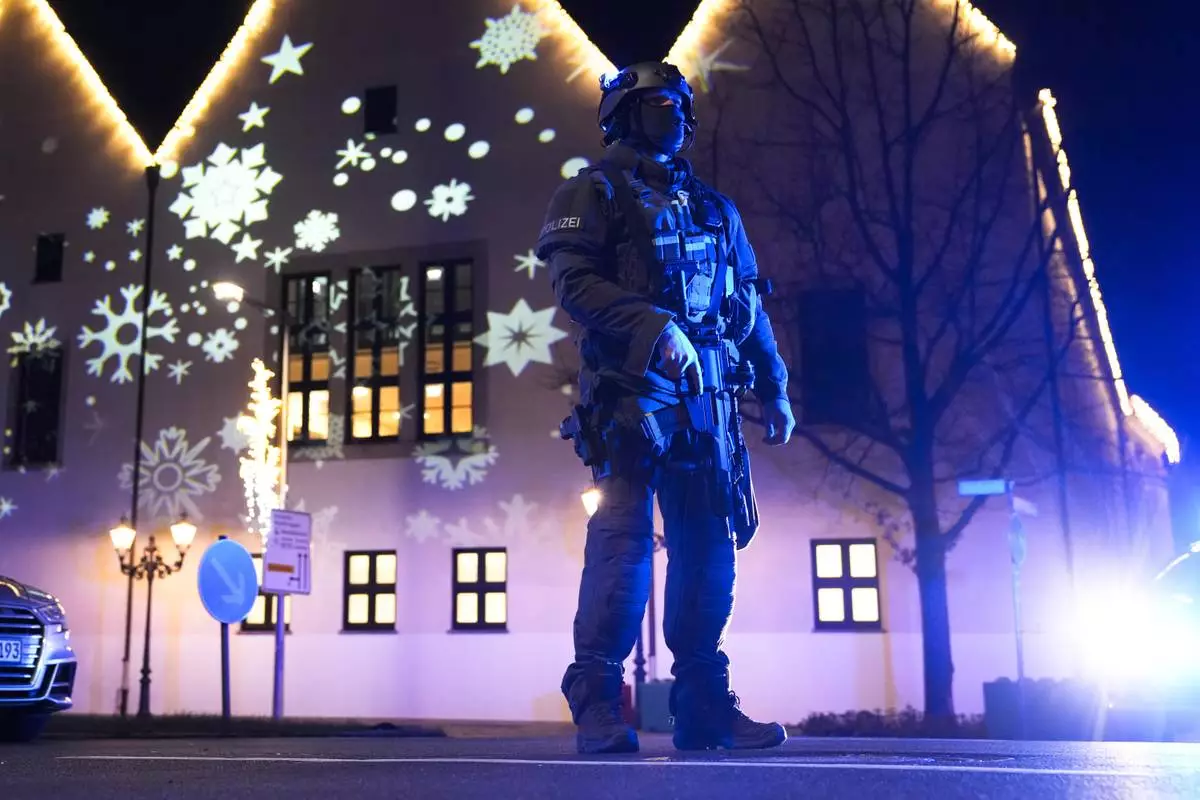
A police officer guards at a cordoned-off area near a Christmas Market after an incident in Magdeburg, Germany, Friday, Dec. 20, 2024. (AP Photo/Ebrahim Noroozi)
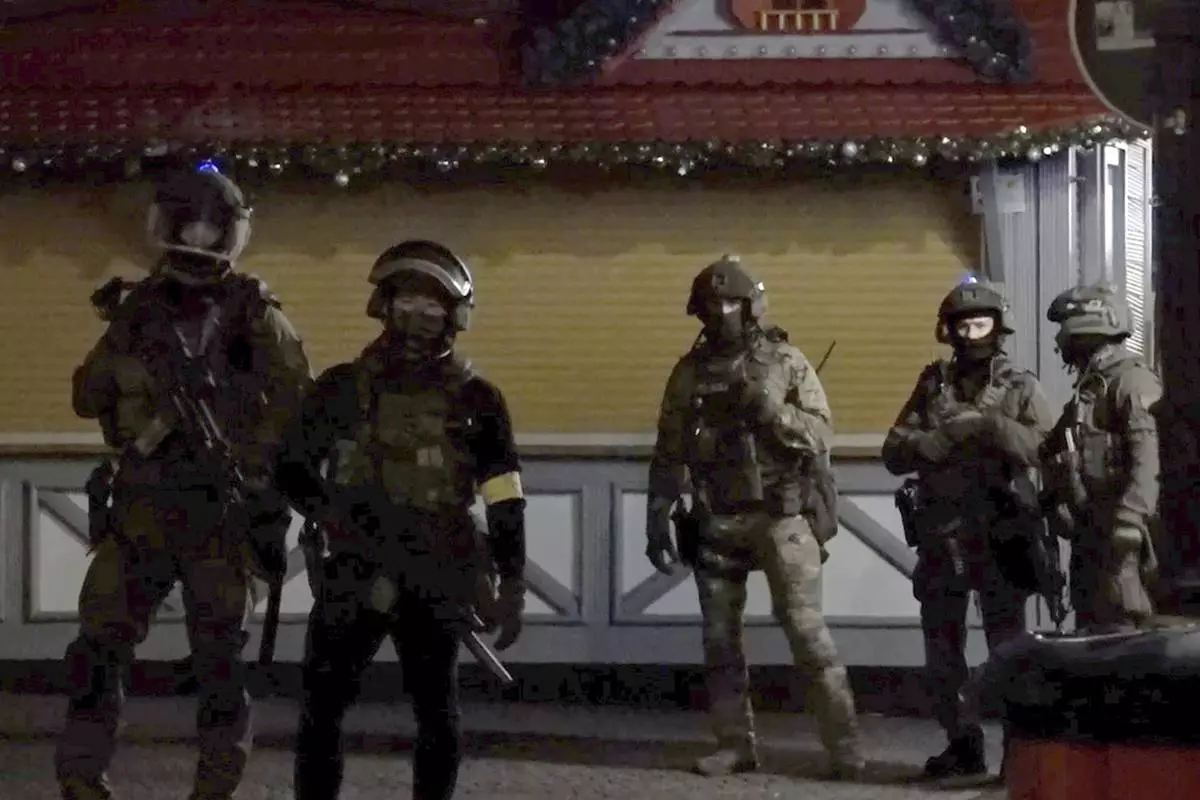
In this screen grab image from video, special police forces attend an incident at the Christmas market in Magdeburg, Germany, Friday Dec. 20, 2024. (Thomas Schulz/dpa via AP)
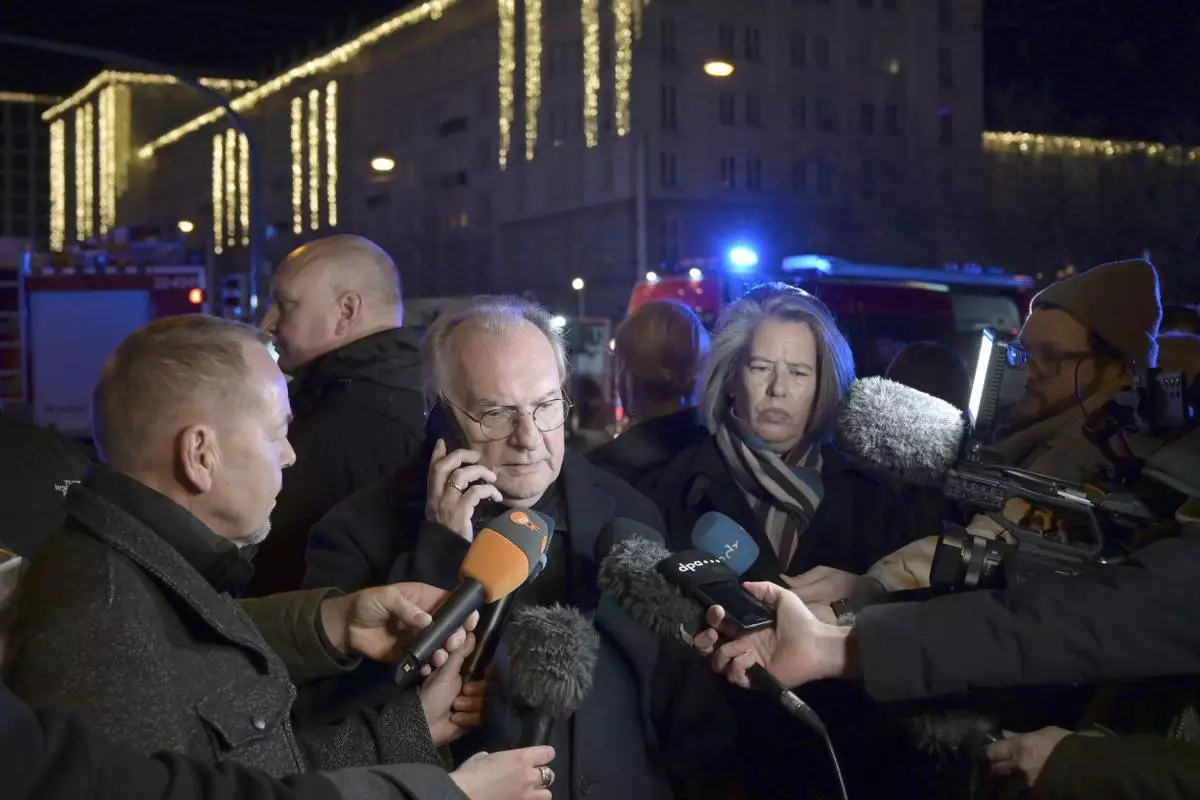
Reiner Haseloff (M, CDU), Minister President of Saxony-Anhalt, makes a statement after an incident at the Christmas market in Magdeburg, Germany, Friday Dec. 20, 2024. (Heiko Rebsch/dpa via AP)
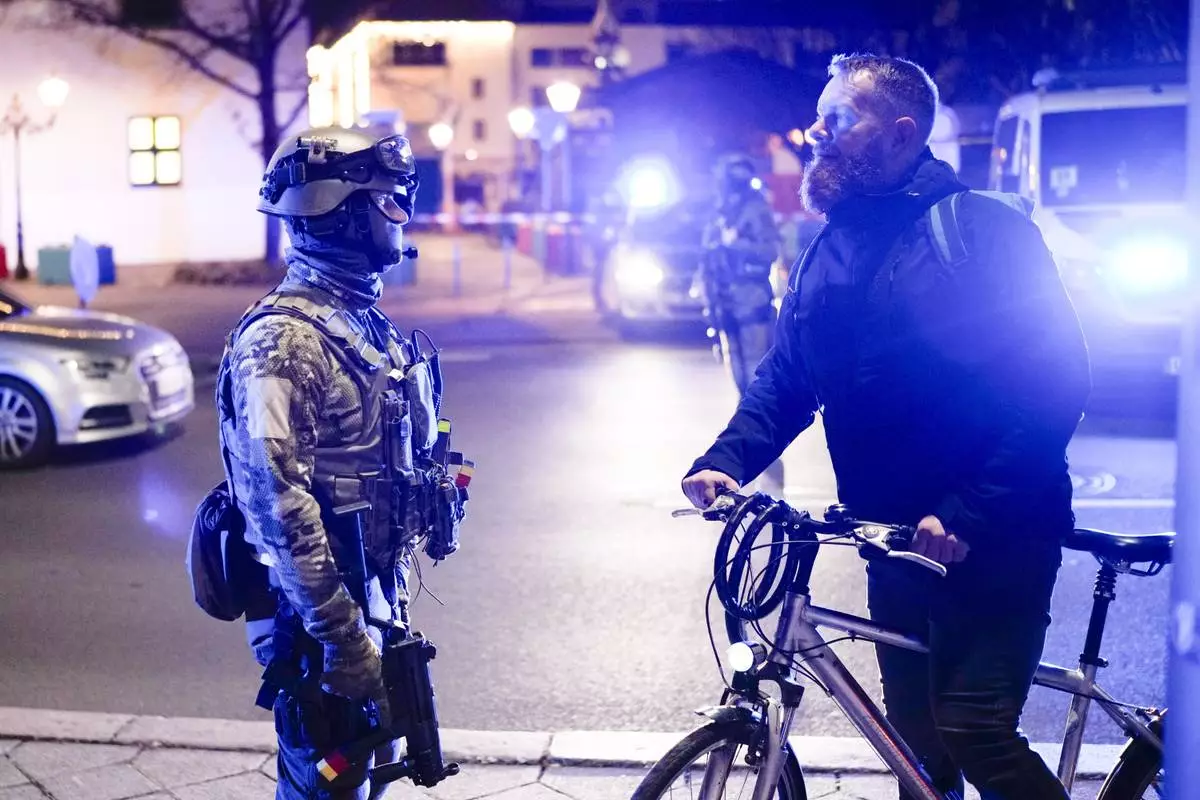
A police officer speaks with a man at a cordoned-off area near a Christmas Market after an incident in Magdeburg, Germany, Friday, Dec. 20, 2024. (AP Photo/Ebrahim Noroozi)
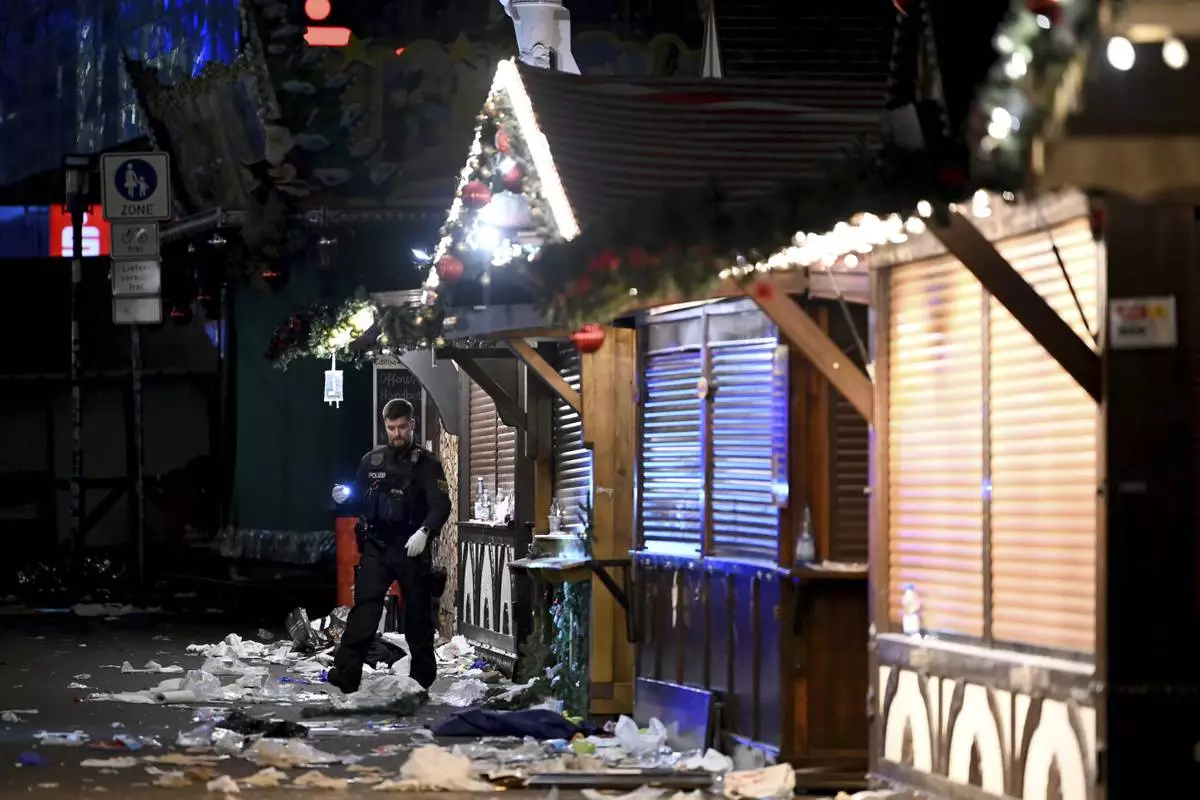
A policeman is seen at the Christmas market where an incident happened in Magdeburg, Germany, Friday Dec. 20, 2024. (Heiko Rebsch/dpa via AP)
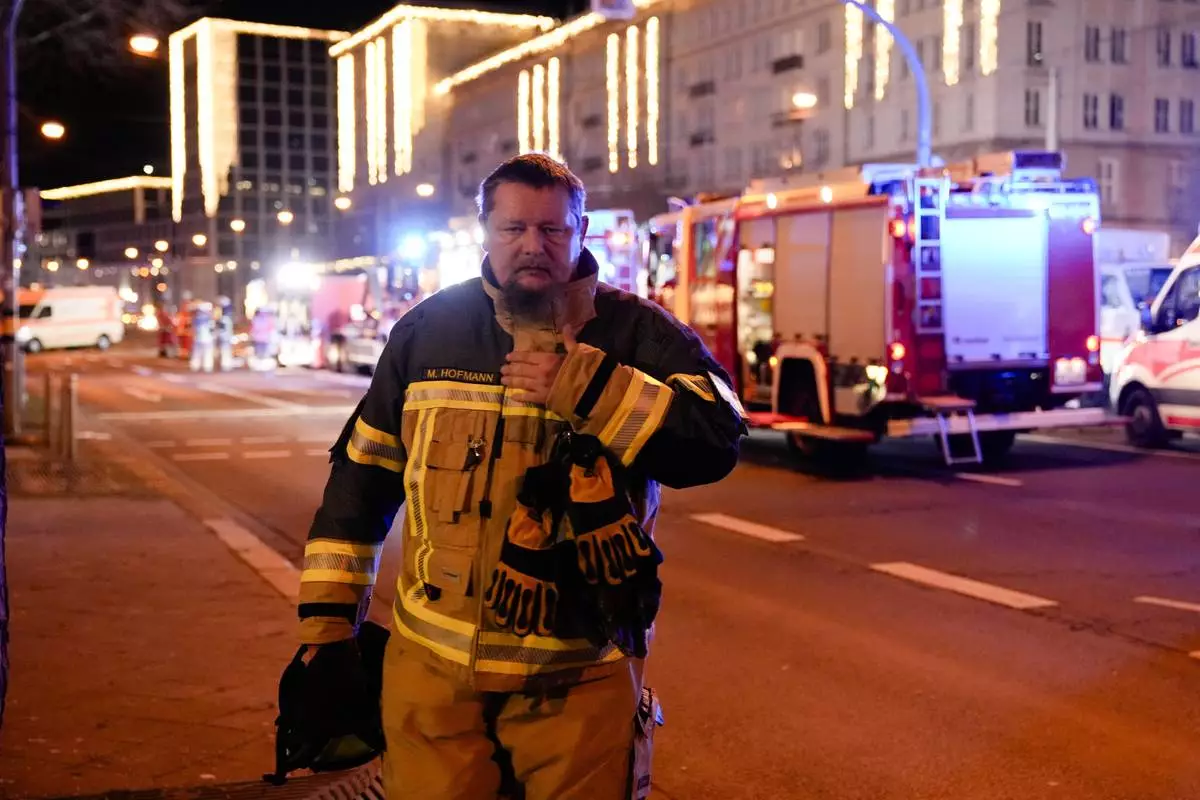
A firefighter walks through a cordoned-off area near a Christmas Market, after a car drove into a crowd in Magdeburg, Germany, Saturday, Dec. 21, 2024. (AP Photo/Ebrahim Noroozi)
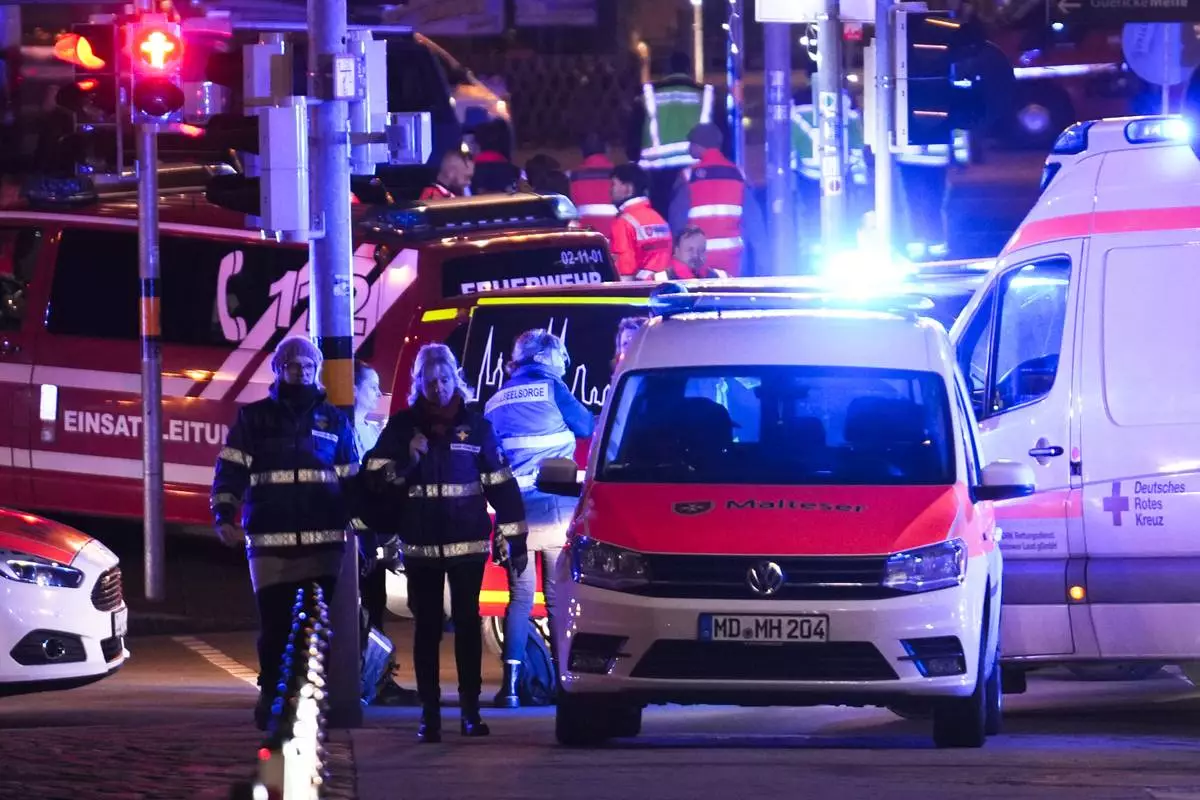
Emergency services work in a cordoned-off area near a Christmas Market, after an incident in Magdeburg, Germany, Friday, Dec. 20, 2024. (AP Photo/Ebrahim Noroozi)
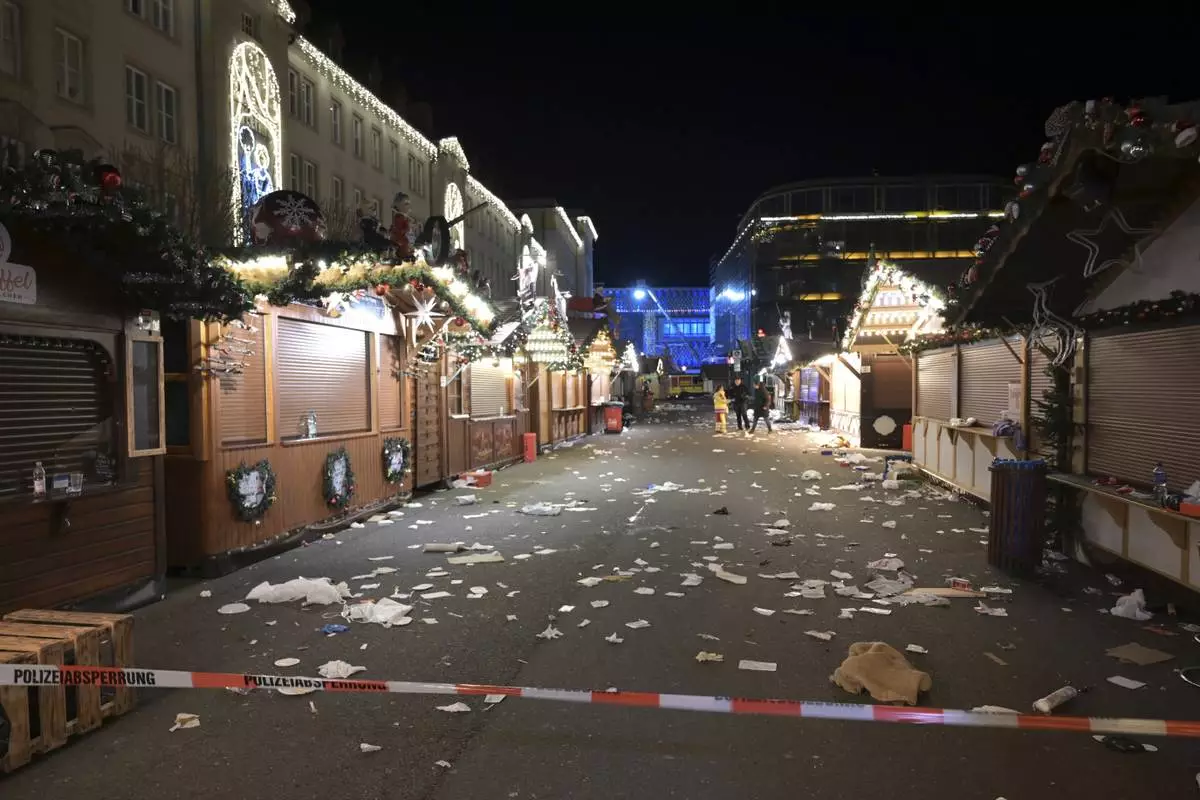
A view of the cordoned-off Christmas market after an incident in Magdeburg, Germany, Friday Dec. 20, 2024. (Heiko Rebsch/dpa via AP)

A police officer guards at a blocked road near a Christmas market after an incident in Magdeburg, Germany, Friday, Dec. 20, 2024. (AP Photo/Ebrahim Noroozi)
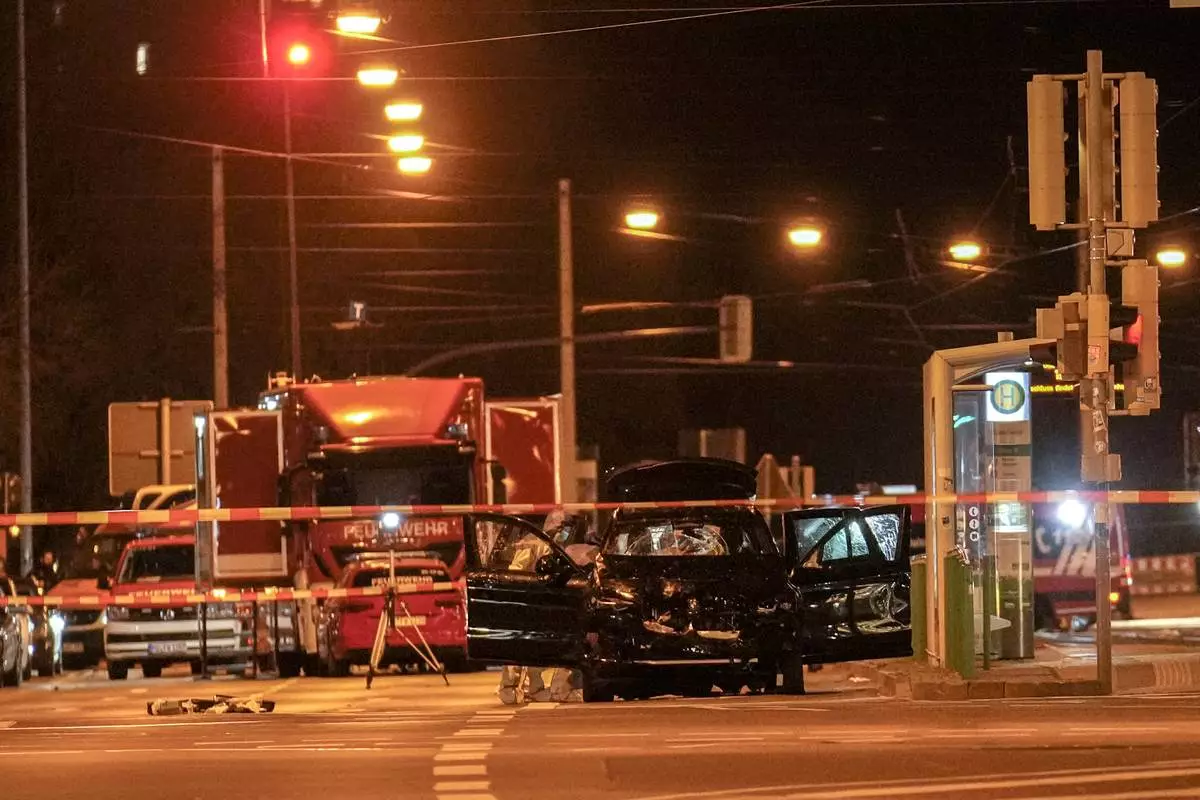
The car that was crashed into a crowd of people at the Magdeburg Christmas market is seen following the attack in Magdeburg, Germany, Saturday early morning, Dec. 21, 2024. (AP Photo/Ebrahim Noroozi)
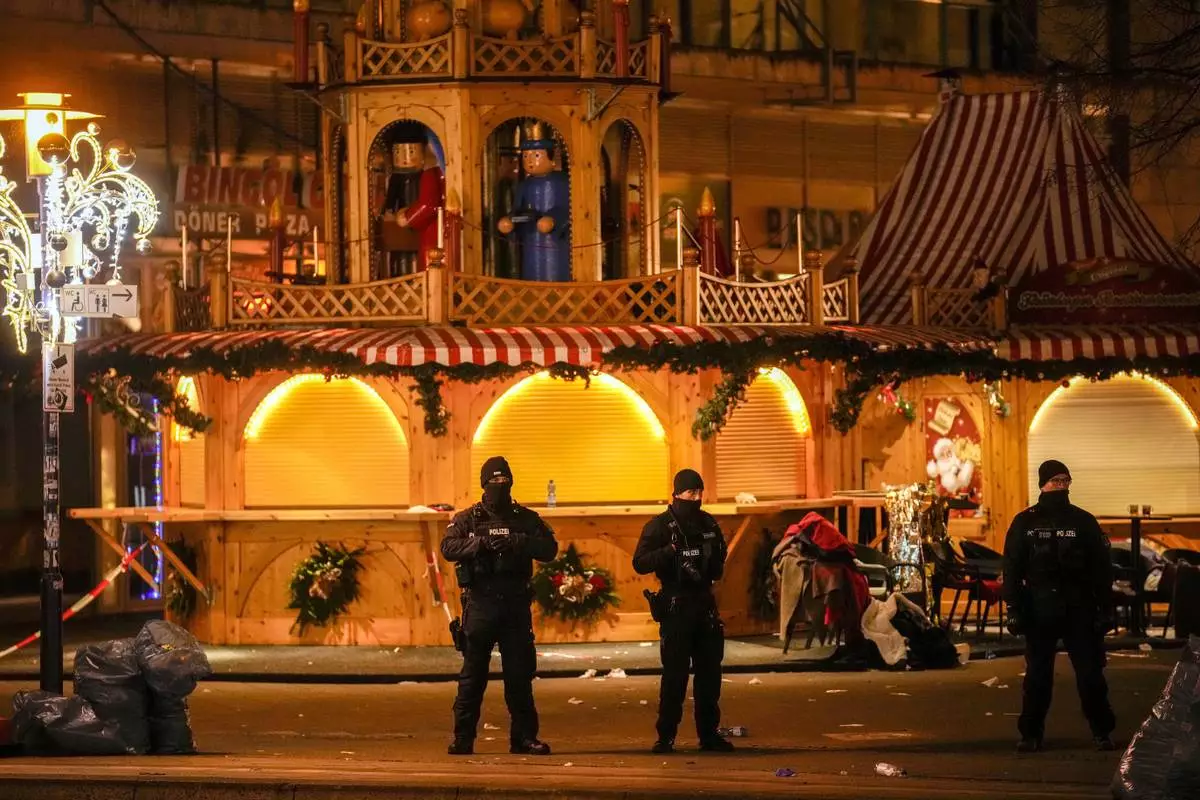
Security guards stand in front of a cordoned-off Christmas Market after a car crashed into a crowd of people, in Magdeburg, Germany, Saturday early morning, Dec. 21, 2024. (AP Photo/Ebrahim Noroozi)
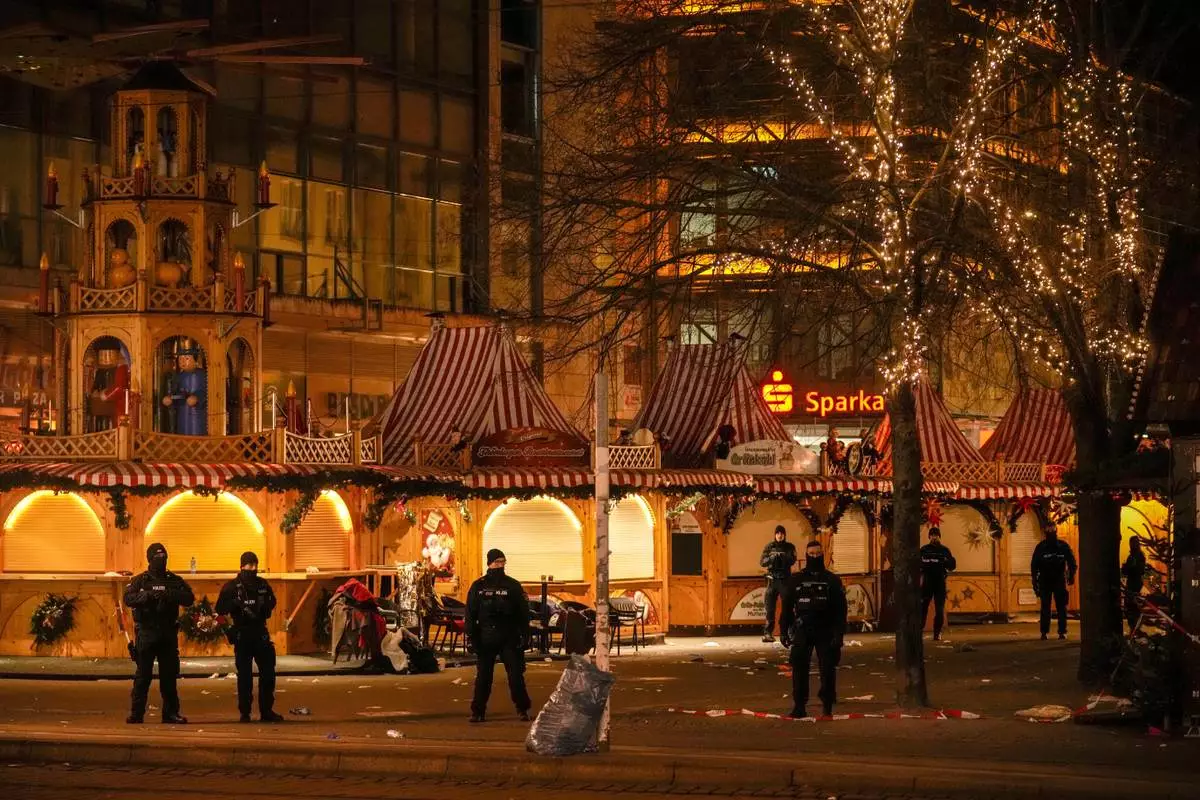
Security guards stand in front of a cordoned-off Christmas Market after a car crashed into a crowd of people, in Magdeburg, Germany, Saturday early morning, Dec. 21, 2024. (AP Photo/Ebrahim Noroozi)
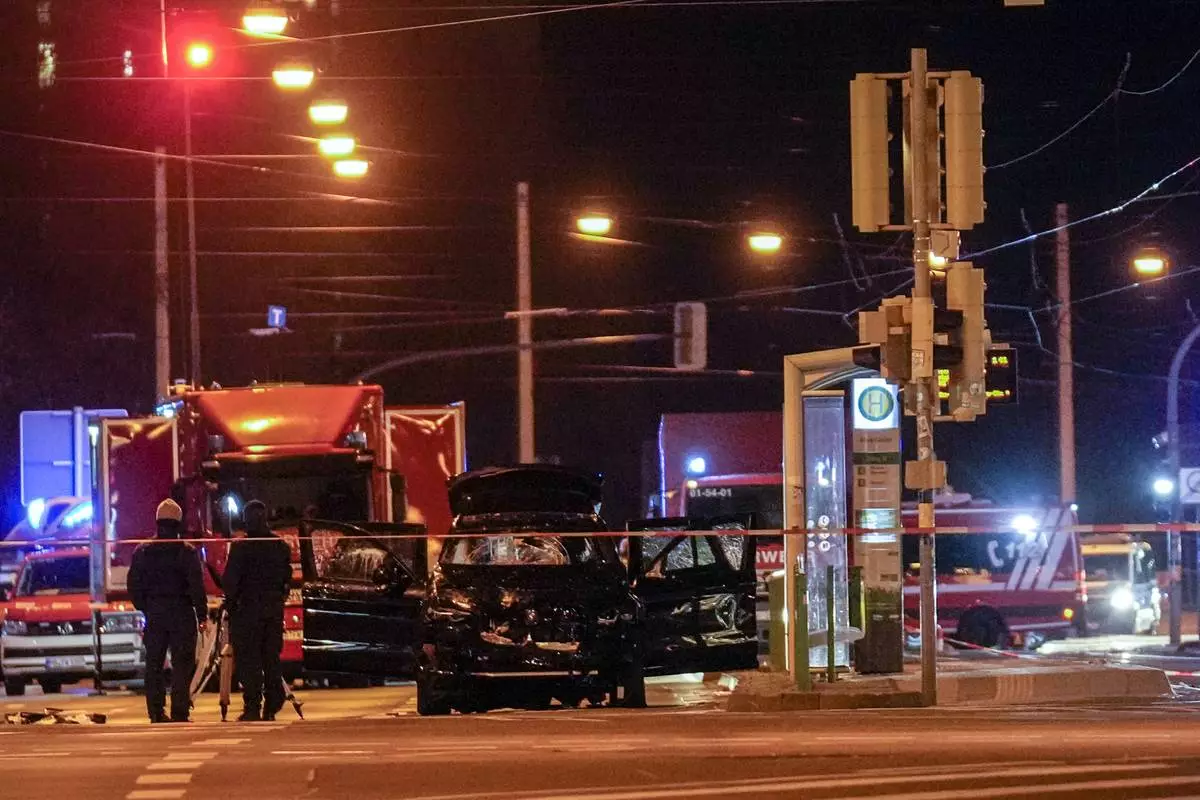
The car that was crashed into a crowd of people at the Magdeburg Christmas market is seen following the attack in Magdeburg, Germany, Saturday early morning, Dec. 21, 2024. (AP Photo/Ebrahim Noroozi)
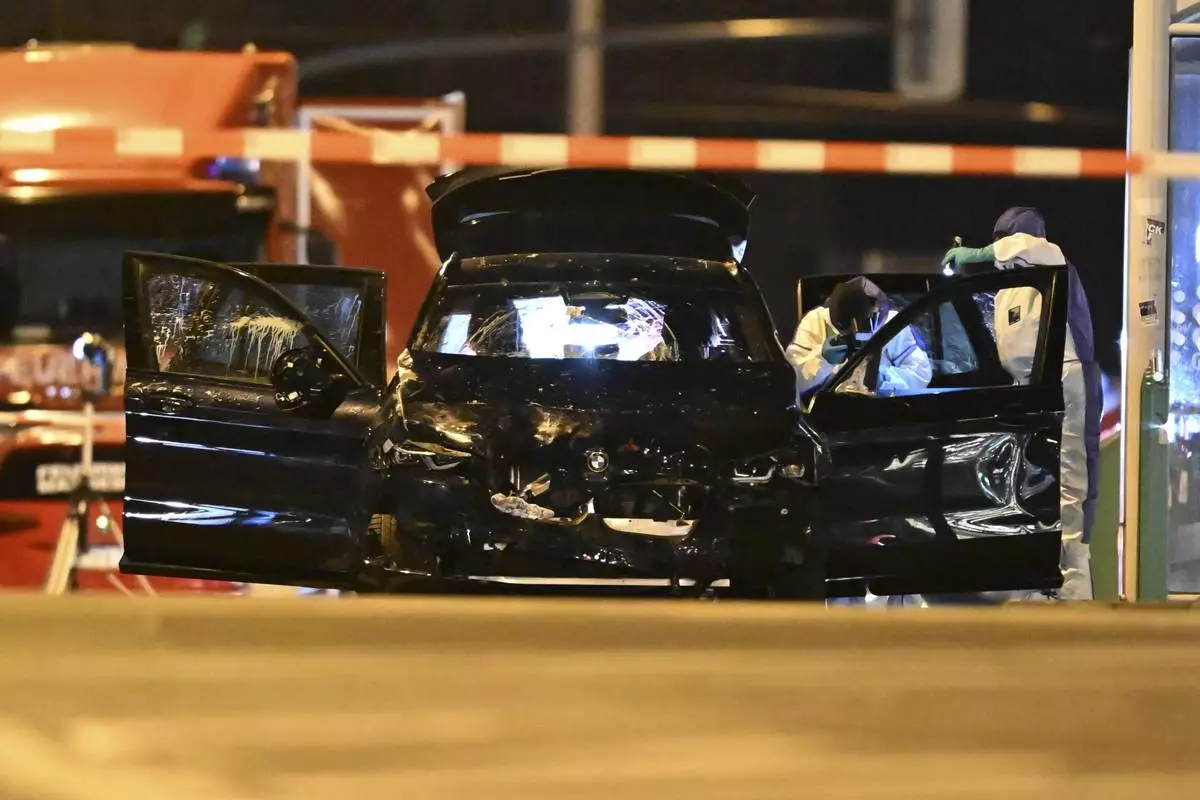
Forensics work on a damaged car sitting with its doors open after a driver plowed into a busy Christmas market in Magdeburg, Germany, early Saturday, Dec. 21, 2024. (Hendrik Schmidt/dpa via AP)










